- Peer Review Checklist
Each essay is made up of multiple parts. In order to have a strong essay each part must be logical and effective. In many cases essays will be written with a strong thesis, but the rest of the paper will be lacking; making the paper ineffective. An essay is only as strong as its weakest point.

Using a checklist to complete your review will allow you to rate each of the parts in the paper according to their strength. There are many different peer review checklists, but the one below should be helpful for your assignment.
- Is the thesis clear?
- Does the author use his or her own ideas in the thesis and argument?
- Is the significance of the problem in the paper explained? Is the significance compelling?
- Are the ideas developed logically and thoroughly?
- Does the author use ethos effectively?
- Does the author use pathos effectively?
- Are different viewpoints acknowledged?
- Are objections effectively handled?
- Does the author give adequate explanations about sources used?
- Are the sources well-integrated into the paper, or do they seem to be added in just for the sake of adding sources?
- Is the word choice specific, concrete and interesting?
- Are the sentences clear?
- Is the overall organization of the argument effective?
- Are the transitions between paragraphs smooth?
- Are there any grammatical errors?
Based on the rubric found at: Grading Rubric Template (Word)
- Authored by : J. Indigo Eriksen. Provided by : Blue Ridge Community College. License : CC BY-NC-SA: Attribution-NonCommercial-ShareAlike
- Image of checklist. Authored by : Jurgen Appelo. Located at : https://flic.kr/p/hykfe7 . License : CC BY: Attribution
- Peer Review Checklist. Authored by : Robin Parent. Provided by : Utah State University English Department. Project : USU Open CourseWare Initiative. License : CC BY-NC-SA: Attribution-NonCommercial-ShareAlike
- Table of Contents

Instructor Resources (Access Requires Login)
- Overview of Instructor Resources
An Overview of the Writing Process
- Introduction to the Writing Process
- Introduction to Writing
- Your Role as a Learner
- What is an Essay?
- Reading to Write
- Defining the Writing Process
- Videos: Prewriting Techniques
- Thesis Statements
- Organizing an Essay
- Creating Paragraphs
- Conclusions
- Editing and Proofreading
- Matters of Grammar, Mechanics, and Style
- Comparative Chart of Writing Strategies
Using Sources
- Quoting, Paraphrasing, and Avoiding Plagiarism
- Formatting the Works Cited Page (MLA)
- Citing Paraphrases and Summaries (APA)
- APA Citation Style, 6th edition: General Style Guidelines
Definition Essay
- Definitional Argument Essay
- How to Write a Definition Essay
- Critical Thinking
- Video: Thesis Explained
- Effective Thesis Statements
- Student Sample: Definition Essay
Narrative Essay
- Introduction to Narrative Essay
- Student Sample: Narrative Essay
- "Shooting an Elephant" by George Orwell
- "Sixty-nine Cents" by Gary Shteyngart
- Video: The Danger of a Single Story
- How to Write an Annotation
- How to Write a Summary
- Writing for Success: Narration
Illustration/Example Essay
- Introduction to Illustration/Example Essay
- "She's Your Basic L.O.L. in N.A.D" by Perri Klass
- "April & Paris" by David Sedaris
- Writing for Success: Illustration/Example
- Student Sample: Illustration/Example Essay
Compare/Contrast Essay
- Introduction to Compare/Contrast Essay
- "Disability" by Nancy Mairs
- "Friending, Ancient or Otherwise" by Alex Wright
- "A South African Storm" by Allison Howard
- Writing for Success: Compare/Contrast
- Student Sample: Compare/Contrast Essay
Cause-and-Effect Essay
- Introduction to Cause-and-Effect Essay
- "Cultural Baggage" by Barbara Ehrenreich
- "Women in Science" by K.C. Cole
- Writing for Success: Cause and Effect
- Student Sample: Cause-and-Effect Essay
Argument Essay
- Introduction to Argument Essay
- Rogerian Argument
- "The Case Against Torture," by Alisa Soloman
- "The Case for Torture" by Michael Levin
- How to Write a Summary by Paraphrasing Source Material
- Writing for Success: Argument
- Student Sample: Argument Essay
- Grammar/Mechanics Mini-lessons
- Mini-lesson: Subjects and Verbs, Irregular Verbs, Subject Verb Agreement
- Mini-lesson: Sentence Types
- Mini-lesson: Fragments I
- Mini-lesson: Run-ons and Comma Splices I
- Mini-lesson: Comma Usage
- Mini-lesson: Parallelism
- Mini-lesson: The Apostrophe
- Mini-lesson: Capital Letters
- Grammar Practice - Interactive Quizzes
- De Copia - Demonstration of the Variety of Language
- Style Exercise: Voice
The Ultimate Essay Checklist
#scribendiinc
Getting Started
Essay writing: it might not be your favorite thing in the world, but the essay editing experts at Scribendi are here to change that by making it a little less scary and a lot more fun! (Okay—perhaps "fun" is a bit strong. How about "bearable"?)
While there are four main types of essays—expository, persuasive, analytical, and argumentative—the basic structure of any essay is the same:
- An introductory paragraph
- At least three body paragraphs
- A concluding paragraph
- A bibliography
Generally, the higher your level of education, the more complex your essay structure will be. While high school students typically stick with the five-paragraph essay, university and graduate students are expected to discuss topics that require more than five paragraphs to flesh out. Whatever type of essay you're writing, following this basic format will help you accomplish your intended goal.
This ultimate essay checklist will provide you with everything you need to unleash your knowledge and express your creativity while following standard essay-writing conventions. This essay checklist will show you how to write a stellar essay of any style, and it will give you the confidence to explore and write about any topic.
General Tips
- Get an early start. It's much easier to come up with and organize your ideas when you're not pressed for time and are able to conduct proper research. The earlier you start, the easier it will be . . . so don't procrastinate!
- Choose a topic. Your instructor will likely give you a handful of topics to choose from or a general topic area. Depending on the instructions you're given, you will have to select and refine the topic. You can choose something you're already interested in or something you know nothing about—either way, you'll be doing your research and learning along the way.
- Use various sources of information. With the vast amount of information available today, you're far from limited when it comes to choosing your sources. Use books, websites, journal articles, research studies, interviews—the world is your oyster! Just remember to keep track of your sources so that you can cite them properly and add them to your bibliography. Also check what kinds of sources your professor wants: primary, secondary, or both?
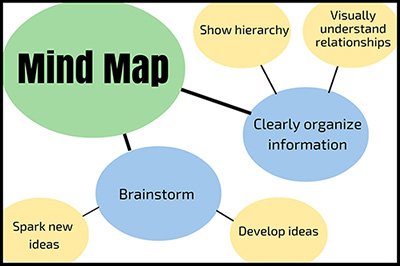
- Do not plagiarize. Cite your work and give credit where it's due. Do not take credit for others' thoughts or ideas, and make yourself aware of the basic rules for avoiding plagiarism .
- Create an outline. Make a rough outline of the sections and points of your essay. Writing your ideas down will help you organize your thoughts and see what you need to add, change, or rearrange.
- Provide evidence. Use evidence from your research to support your ideas. Each body paragraph will contain an original idea, but you will need to back it up with evidence to make it credible.
- Don't use "I" statements or make sweeping generalizations. Stay objective, and be specific.
- Grab your audience's attention. Come up with an attention-grabbing title and introduction that will make your reader want more.
- Use logic. Within each paragraph and throughout your essay, keep your ideas coherent and linear.
- Use an essay style that complements your content (and is in accordance with your professor's guidelines). There are four main types of essays:
- Expository : The writer explains an idea or issue to the reader.
- Persuasive : The writer tries to convince the reader to take his or her position on an idea, issue, or topic.
- Analytical : The writer examines and analyzes an idea, issue, or topic.
- Argumentative : The writer tries to prove that his or her position is correct.
- Answer what , why , and how . Regardless of the type of essay you write, it should answer each of these questions.
- Don't feel obliged to write your first draft in order, from introduction to bibliography. It can be difficult to write a completely linear essay when you have lots of different ideas, so start by writing whatever you're ready to write—you can put all the pieces together later. This will make the process easier and less stressful.
Introduction
The introductory paragraph broadly introduces your topic by giving your reader an overview of what your essay will be about and the points that will be discussed. It often starts with a general statement that acts as the topic sentence for the paragraph, and it provides a general discussion that leads to a specific thesis statement at the end of the paragraph.
- Do not explicitly explain your intentions. For example, do not say, "The purpose of this essay is to . . ." Instead, allow the topic sentence to help your reader identify and determine your purpose. By the time readers get to the end, they will have a comprehensive understanding of your essay and its intent.
- Choose a thesis statement that the body of your essay will be able to support. This thesis will be the "hook" of your essay, and it is often one of the last sentences in the introductory paragraph. A hook is a line that grabs the reader's attention—it "hooks" them, just like a fishing hook grabs a fish. The goal of the hook is to keep your reader interested and to clearly indicate the purpose of the essay.
The body of the essay develops the argument that was outlined in the introduction.
- Use topic sentences. The topic sentence of each paragraph provides a brief summary of what the paragraph is about.

- Set up the transition to your next point. The concluding sentence of each paragraph should function as a hook and transition into the next paragraph.
- Discuss and support a different idea in each paragraph. Limit each paragraph to one main idea. The topic sentence of each paragraph will help you organize your own thoughts and let the reader know what that paragraph is about. If you're writing a five-paragraph essay, follow this general outline:
- The first paragraph contains the strongest argument and ties into the hook at the end of the introductory paragraph. Discuss your first point, elaborate on it, and provide evidence in support of it. Close with a transitional hook.
- The second paragraph contains a more neutral argument, and it ties into the hook at the end of the first paragraph. Discuss your second point, elaborate on it, and provide evidence to support it. Close with a transitional hook.
- The third paragraph contains another strong argument and ties into the hook at the end of the second paragraph. Discuss your third point, elaborate on it, and provide evidence to support it. Close with a transitional sentence that leads smoothly into the concluding paragraph.
In contrast to the introductory paragraph, the concluding paragraph starts out specific (by reintroducing the thesis) and becomes more general. It ties your ideas together and brings your paper to a culmination.
The concluding paragraph provides a general discussion of your findings and shows the reader that you have accomplished what you intended to at the outset.
- Restate your thesis (though not necessarily using the exact same words). In contrast to the introductory paragraph, the concluding paragraph starts out specific (by reintroducing the thesis) and becomes more general. It ties your ideas together and brings your paper to a close.
- Discuss your findings based on your research and evidence. Has your thesis been proven?
- Don't introduce any new ideas. The point here is to sum up and wrap up your essay, not to confuse readers by providing new information.
- End on a high note. You can finish the essay in a variety of ways. For example, you might provide suggestions for future research, state a call to action, share a quote, or ask a question. Depending on the topic and purpose of your essay, choose a closing line that will fit well with the rest of your essay's structure and leave readers thinking " Wow! "
Bibliography/Works Cited
The Bibliography or Works Cited page is a list of all the references you used throughout the paper. It can be alphabetized or numbered depending on the style guide you are using. While a Bibliography includes every resource you consulted when preparing your essay, a Works Cited page includes only the resources cited in your essay. Find out which is required by consulting the style guide assigned by your professor.
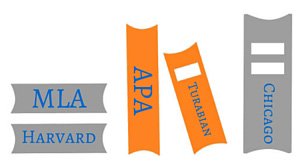
- To make creating your reference list easier, use citation software . There are many different options out there, and several of the software programs are free (especially if you're enrolled in a university that has a subscription to one of the services). These citation software programs essentially create your bibliography for you, making the process fast, easy, and accurate.
Review, Revise, Rework
- Give yourself a day or two before rereading and revising your essay. This way, you will have a fresh set of eyes, making it easier to catch any mistakes.
- Don't be afraid to rearrange paragraphs, delete sentences, or add information. Reading through your essay a few days after writing it makes it much easier to see where and how the structure needs to be changed.
- Correct any errors in spelling, grammar, and punctuation. Check the essay yourself, have a friend review it, or better yet, have your essay edited by a professional editing service .
- Avoid colloquialisms and contractions. ('Cause it just ain't professional in an academic setting. Lol.)
- Analyze the flow of your essay , and make sure that your ideas and paragraphs flow smoothly from one to the next.
- Cut out any extraneous information or fluff. We've all done it, but adding extra words to make a word count requirement doesn't fly with most professors, and it will definitely detract from the strength of your essay.
Now, it's Time to Write!
It may seem overwhelming, but writing an essay doesn't have to be stressful. After coming up with a topic, doing some research, and creating a basic outline, you're ready to start filling in the gaps. Using primary and/or secondary research, back up your ideas and support them with credible sources. Just don't forget to cite those sources! Once you've written your first draft, take a day or two away from your paper so you will have a clear head when you come back to revise it. As suggested, you may even want to have your paper edited by the professionals at Scribendi , who will not only correct any surface-level errors but will also check for consistency, clarity, and cohesiveness, providing comments and suggestions along the way.
Essay writing is so much easier if you're equipped with the right tools, and that's what we hope we've given you with this ultimate essay checklist. Now that you know how to write an essay (regardless of the style), we're confident in your ability to write an essay about any topic that your instructor might have in store for you. Happy writing!
Image sources: Foundry/Pixabay.com, succo/Pixabay.com, ClkerFreeVectorImages/Pixabay.com
Ask a Professional to Edit Your Essay
Hire one of our expert editors , or get a free sample.
Have You Read?
"The Complete Beginner's Guide to Academic Writing"
Related Posts

Escape the Five-Paragraph Essay

Essay Writing Help

How to Write a Great Thesis Statement
Upload your file(s) so we can calculate your word count, or enter your word count manually.
We will also recommend a service based on the file(s) you upload.
| File | Word Count | Include in Price? |
|---|
English is not my first language. I need English editing and proofreading so that I sound like a native speaker.
I need to have my journal article, dissertation, or term paper edited and proofread, or I need help with an admissions essay or proposal.
I have a novel, manuscript, play, or ebook. I need editing, copy editing, proofreading, a critique of my work, or a query package.
I need editing and proofreading for my white papers, reports, manuals, press releases, marketing materials, and other business documents.
I need to have my essay, project, assignment, or term paper edited and proofread.
I want to sound professional and to get hired. I have a resume, letter, email, or personal document that I need to have edited and proofread.
Prices include your personal % discount.
Prices include % sales tax ( ).

- PRO Courses Guides New Tech Help Pro Expert Videos About wikiHow Pro Upgrade Sign In
- EDIT Edit this Article
- EXPLORE Tech Help Pro About Us Random Article Quizzes Request a New Article Community Dashboard This Or That Game Happiness Hub Popular Categories Arts and Entertainment Artwork Books Movies Computers and Electronics Computers Phone Skills Technology Hacks Health Men's Health Mental Health Women's Health Relationships Dating Love Relationship Issues Hobbies and Crafts Crafts Drawing Games Education & Communication Communication Skills Personal Development Studying Personal Care and Style Fashion Hair Care Personal Hygiene Youth Personal Care School Stuff Dating All Categories Arts and Entertainment Finance and Business Home and Garden Relationship Quizzes Cars & Other Vehicles Food and Entertaining Personal Care and Style Sports and Fitness Computers and Electronics Health Pets and Animals Travel Education & Communication Hobbies and Crafts Philosophy and Religion Work World Family Life Holidays and Traditions Relationships Youth
- Browse Articles
- Learn Something New
- Quizzes Hot
- Happiness Hub
- This Or That Game
- Train Your Brain
- Explore More
- Support wikiHow
- About wikiHow
- Log in / Sign up
- Education and Communications
- College University and Postgraduate
- Academic Writing
How to Write Any High School Essay (With Examples!)
Last Updated: August 1, 2024 Fact Checked
- Research & Outlining Your Essay
- Writing the Intro
- Types of Essays & Sample Topics
Writing Techniques Cheat Sheet
This article was co-authored by Emily Listmann, MA and by wikiHow staff writer, Sophie Burkholder, BA . Emily Listmann is a Private Tutor and Life Coach in Santa Cruz, California. In 2018, she founded Mindful & Well, a natural healing and wellness coaching service. She has worked as a Social Studies Teacher, Curriculum Coordinator, and an SAT Prep Teacher. She received her MA in Education from the Stanford Graduate School of Education in 2014. Emily also received her Wellness Coach Certificate from Cornell University and completed the Mindfulness Training by Mindful Schools. There are 16 references cited in this article, which can be found at the bottom of the page. This article has been fact-checked, ensuring the accuracy of any cited facts and confirming the authority of its sources. This article has been viewed 566,274 times.
Writing an essay is an important basic skill that you will need to succeed in high school, college, and beyond. While the exact requirements of any essay will vary depending on the teacher and assignment, most high school essays follow the same basic structure. By presenting a well-written five-paragraph essay with a strong thesis statement, you can successfully write an essay for any high school class or topic!
Writing in a High School Essay Format
Decide on and research a topic, then create your essay outline. Write an introduction that states your argument with a thesis statement, then support the thesis statement with evidence in your three main body paragraphs. Finally, restate your thesis and summarize your argument in your concluding paragraph.
Writing a High School Essay: The Preparation Stage

- While most high school essays follow a similar format, different requirements are needed for different types of essays —such as a persuasive, expository, narrative, or descriptive essay. [1] X Research source
- If you need help coming up with a topic , brainstorm or search for subjects related to your assignment’s focus.

- Eventually, the sources you find in your research will be the evidence to back up the main point of your essay.

- For example, the statement “Elephants are used to perform in circuses” does not offer an arguable point—this statement just presents a fact.
- Instead, you may try a thesis statement like “Elephants should not be kept in the circus since they are mistreated.” Since people may reasonably agree or disagree with this statement, you’ll be able to find supporting arguments for and against it to use in your essay.
- Keep in mind that some types of essay writing may not require an argument, such as a narrative essay. However, the standard high school essay structure typically requires a thesis statement.

- Introduction Paragraph Hook: Thesis Statement:
- Body Paragraph 1 Topic Sentence: Supporting Evidence #1: Supporting Evidence #2: Supporting Evidence #3:
- Body Paragraph 2 Topic Sentence: Supporting Evidence #1: Supporting Evidence #2: Supporting Evidence #3:
- Body Paragraph 3 Topic Sentence: Supporting Evidence #1: Supporting Evidence #2: Supporting Evidence #3:

- Talk to your school’s librarian for direction on specific books or databases you could use to find your information.
- Many schools offer access to online databases like EBSCO or JSTOR where you can find reliable information. If you need help, consult with your teacher.
- Wikipedia is a great starting place for your research, but it can be edited by anyone in the world, so it’s not a reliable source. Instead, look at a related Wikipedia article’s references to find the sites where the information really came from.
- Use Google Scholar if you want to find peer-reviewed scholarly articles for your sources.
- Make sure to consider the author’s qualifications when determining source credibility . If a source does not include the author’s name, then it might not be a good option.
Writing an Essay Introduction

- However, make sure that your hook is both accurate and related to the subject of your essay.
- Example : Gender inequality has been an inescapable fact of life for as long as history can remember.

- Example: Women have been seen as inferior, and have been treated as such, for centuries. But to respond to such sexist ideas and treatment, the modern feminist movement arose. Feminism has become a prevalent theme in all forms of art, including literature. Feminist criticism examines works of literature in order to analyze their portrayal of the sexes.

- Example: In John Steinbeck’s short story “The Chrysanthemums,” the lens of feminist criticism provides insight into how the issue of gender inequality affects the main protagonist, Elisa Allen.

- Mapping out this structure for the reader helps them know exactly what you’re discussing and what they should expect from the rest of your essay.
- However, this structural preview in the introductory paragraph is typically only included in longer, more advanced essays. If you’re not sure about including this segment, double-check with your teacher. When in doubt, leave it out and end the intro with your thesis.
- Example: This paper begins by exploring the limitations placed on Elisa due to her gender, then goes on to discuss the ways in which Steinbeck showcases Elisa’s struggles through symbolism and other literary devices. Finally, this essay will explore the modern-day parallels of Elisa’s story and the continuing ramifications of gender inequality.

Writing Body Paragraphs

- Check with your teacher if you’re not sure how many paragraphs should be in the body of your essay.

- Don’t assume your reader will make the connection between your info and the thesis of your paper. Analysis also gives you a chance to include your own thoughts and interpretation of the facts you provide.
- Unless you’re writing a personal essay, avoid the use of “I” statements since this could make your essay look less professional.
- When quoting or paraphrasing specific pieces of information or evidence, don’t forget to cite your sources in-text based on the format required for your paper. [10] X Research source Many high school essays are written in MLA or APA style. Ask your teacher what format they want you to follow if it’s not specified.

- For example, if your body paragraphs discuss similar points in a different way, you can use phrases like “in the same way,” “similarly,” and “just as” to start other body paragraphs.
- If you are posing different points, try phrases like “in spite of,” “in contrast,” or “however” to transition.

Writing an Essay Conclusion

- For example, if your thesis was, “The cell phone is the most important invention in the past 30 years,” then you may restate the thesis in your conclusion like, “Due to the ability to communicate anywhere in the world and access information easily, the cell phone is a pivotal invention in human history.”
- If you’re only writing a 1-page paper, restating your main ideas isn’t necessary.

- For example, if you write an essay discussing the themes of a book, think about how the themes are affecting people’s lives today.

- Try to pick the same type of closing sentence as you used as your attention getter.

- Including a Works Cited page shows that the information you provided isn’t all your own and allows the reader to visit the sources to see the raw information for themselves.
- Avoid using online citation machines since they may be outdated.

- At the high school level, most teachers dislike common concluding phrases like “To sum up” or “In conclusion,” so avoid using those in your final paragraph.

Revising & Completing Your Essay

- Have a peer or parent read through your essay to see if they understand what point you’re trying to make.
- If you find any off-topic or contradictory sections, cut them from your essay or find a way to tie it into your main focus. If you do cut parts out of your essay, make sure to reread it again to see if it affects the flow of how it reads.

Writing Different Types of High School Essays

- Write a clear thesis statement in the introductory paragraph.
- Provide evidence support for your thesis statement in each body paragraph.
- Use clear and concise language without any figurative or sensory imagery.
- Sample Topics: “What makes a good leader?,” “Describe how the internet changed the world,” “What is the theme of [literary work]?”

- Write a thesis statement in the first paragraph that clearly states your opinion.
- Use well-researched, factual, and detailed information to support your argument .
- Include a counterpoint paragraph where you present the opposing argument and point out its flows.
- Use the conclusion to synthesize the essay and provide insight into further research.
- Sample Topics: “The best music genre is…,” “Is capitalism the best form of economy?,” “Should schools have dress codes?”

- Structure your essay like a story with a plot, characters, setting, conflict, and theme.
- Use the first-person pronoun “I” as needed, since the story is told from your point of view.
- Write the events in chronological order to aid organization and help readers understand better.
- Sample Topics: “Describe a performance or sporting event you took part in,” “Describe a time in your life when you’ve been scared,” “Explain a family tradition, how it developed, and its importance today.”

- Structure your essay with an introduction, body paragraph, and summary conclusion.
- Use figurative and vivid language to provide a sensory description to the reader. Mention what something looks, feels, smells, sounds, and tastes like.
- Use transition words to lead the readers into the right stages of emotions and follow the logical flow of the essay.
- Sample Topics: “What is your happiest memory?,” “Write about your favorite place,” “Describe yourself to someone who has never met you.”

Community Q&A
- If you have writer's block , take a break for a few minutes, stretch, get a snack, and come back to your essay. Thanks Helpful 0 Not Helpful 0
- Your teacher should have provided you with a rubric, so use that as your final guide to make sure your essay is meeting all of the criteria for this assignment. Thanks Helpful 0 Not Helpful 0

- Avoid using plagiarism since this could result in academic consequences. Thanks Helpful 5 Not Helpful 1
You Might Also Like

- ↑ https://www.grammarly.com/blog/types-of-essays/
- ↑ https://writingcenter.unc.edu/tips-and-tools/thesis-statements/
- ↑ https://facultyweb.ivcc.edu/rrambo/eng1001/outline.htm
- ↑ https://guides.libs.uga.edu/reliability
- ↑ https://examples.yourdictionary.com/20-compelling-hook-examples-for-essays.html
- ↑ https://wts.indiana.edu/writing-guides/how-to-write-a-thesis-statement.html
- ↑ https://guidetogrammar.org/grammar/five_par.htm
- ↑ https://academicguides.waldenu.edu/writingcenter/paragraphs/topicsentences
- ↑ https://writingcenter.unc.edu/tips-and-tools/transitions/
- ↑ https://writingcenter.fas.harvard.edu/pages/ending-essay-conclusions
- ↑ https://libguides.newcastle.edu.au/how-to-write-an-essay/conclusion
- ↑ https://pitt.libguides.com/citationhelp
- ↑ https://writingcenter.unc.edu/tips-and-tools/revising-drafts/
- ↑ https://www.csueastbay.edu/scaa/files/docs/student-handouts/expository-essay.pdf
- ↑ https://owl.purdue.edu/owl/general_writing/academic_writing/historical_perspectives_on_argumentation/toulmin_argument.html
- ↑ https://gallaudet.edu/student-success/tutorial-center/english-center/writing/resources-for-writing-different-types-of-essays/guide-to-different-kinds-of-essays/
About This Article

Writing good essays is an important skill to have in high school, and you can write a good one by planning it out and organizing it well. Before you start, do some research on your topic so you can come up with a strong, specific thesis statement, which is essentially the main argument of your essay. For instance, your thesis might be something like, “Elephants should not be kept in the circus because they are mistreated.” Once you have your thesis, outline the paragraphs for your essay. You should have an introduction that includes your thesis, at least 3 body paragraphs that explain your main points, and a conclusion paragraph. Start each body paragraph with a topic sentence that states the main point of the paragraph. As you write your main points, make sure to include evidence and quotes from your research to back it up. To learn how to revise your paper, read more from our Writing co-author! Did this summary help you? Yes No
- Send fan mail to authors
Reader Success Stories
Ariel Arias Petzoldt
Aug 25, 2020
Did this article help you?

Nov 22, 2017
Rose Mpangala
Oct 24, 2018

Featured Articles

Trending Articles

Watch Articles

- Terms of Use
- Privacy Policy
- Do Not Sell or Share My Info
- Not Selling Info
wikiHow Tech Help Pro:
Level up your tech skills and stay ahead of the curve

High School Essay
High school essay generator.
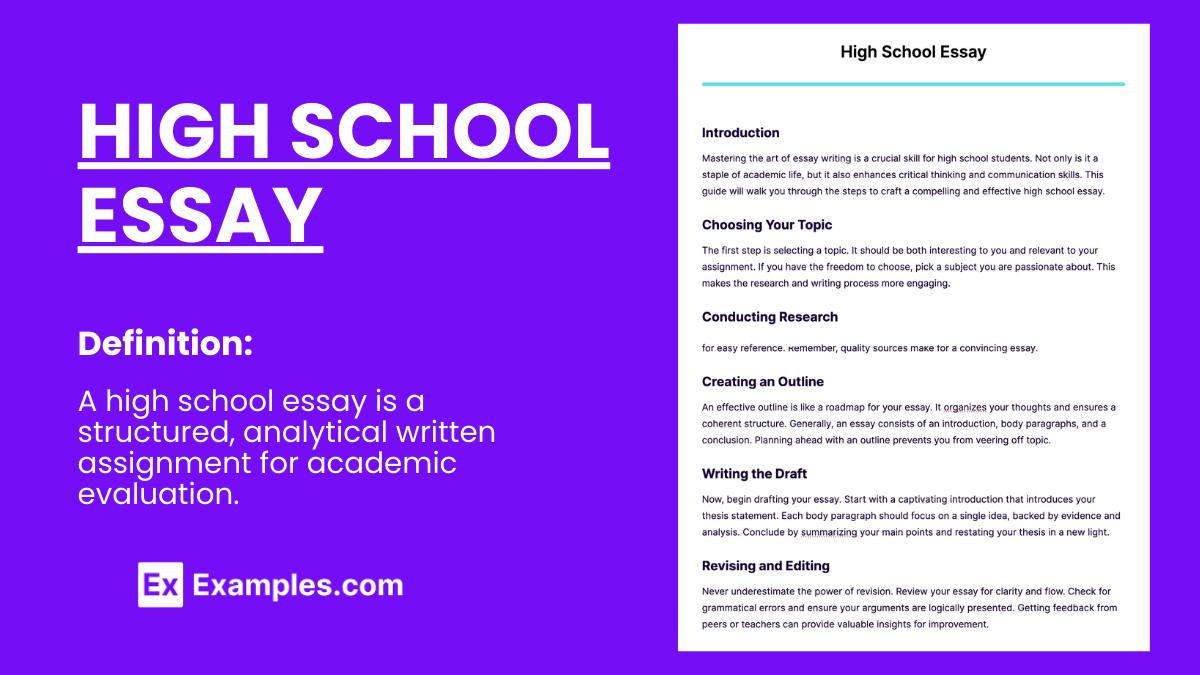
Navigating the complexities of High School Essay writing can be a challenging yet rewarding experience. Our guide, infused with diverse essay examples , is designed to simplify this journey for students. High school essays are a crucial part of academic development, allowing students to express their thoughts, arguments, and creativity. With our examples, students learn to structure their essays effectively, develop strong thesis statements, and convey their ideas with clarity and confidence, paving the way for academic success.
What Is a High School Essay? A high school essay is anything that falls between a literary piece that teachers would ask their students to write. It could be anything like an expository essay , informative essay , or a descriptive essay . High school essay is just a broad term that is used to describe anything that high school student writes, probably in subjects like English Grammar or Literature.
It is a good way to practice every student’s writing skills in writing which they might find useful when they reach college. Others might even be inspired to continue writing and take courses that are related to it.
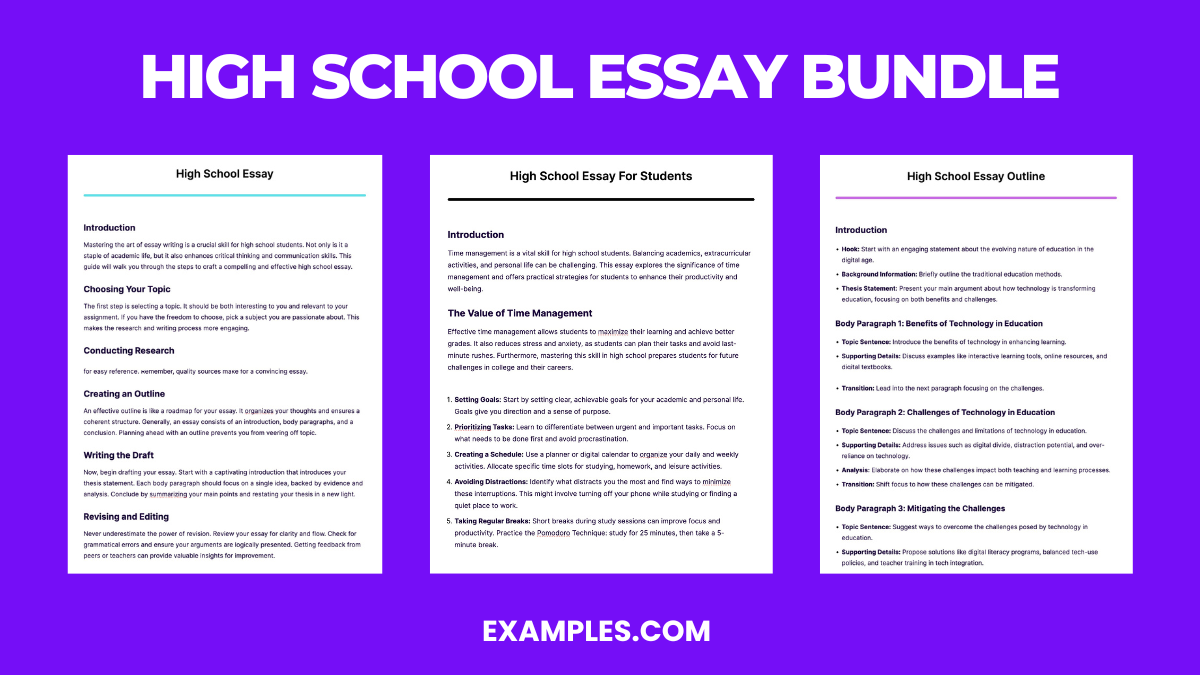
Download High School Essay Bundle
When you are in high school, it is definite that you are expected to do some write-ups and projects which require pen and paper. Yes. You heard that right. Your teachers are going to let you write a lot of things starting from short stories to other things like expository essays. However, do not be intimidated nor fear the things that I have just said. It is but a normal part of being a student to write things. Well, take it from me. As far as I can recall, I may have written about a hundred essays during my entire high school years or maybe more. You may also see what are the parts of an essay?
High School Essay Format
1. introduction.
Hook: Start with an engaging sentence to capture the reader’s interest. This could be a question, a quote, a surprising fact, or a bold statement related to your topic. Background Information: Provide some background information on your topic to help readers understand the context of your essay. Thesis Statement: End the introduction with a clear thesis statement that outlines your main argument or point of view. This statement guides the direction of your entire essay.
2. Body Paragraphs
Topic Sentence: Start each body paragraph with a topic sentence that introduces the main idea of the paragraph, supporting your thesis statement. Supporting Details: Include evidence, examples, facts, and quotes to support the main idea of each paragraph. Make sure to explain how these details relate to your topic sentence and thesis statement. Analysis: Provide your analysis or interpretation of the evidence and how it supports your argument. Be clear and concise in explaining your reasoning. Transition: Use transition words or phrases to smoothly move from one idea to the next, maintaining the flow of your essay.
3. Conclusion
Summary: Begin your conclusion by restating your thesis in a new way, summarizing the main points of your body paragraphs without introducing new information. Final Thoughts: End your essay with a strong closing statement. This could be a reflection on the significance of your argument, a call to action, or a rhetorical question to leave the reader thinking.
Example of High School Essay
Community service plays a pivotal role in fostering empathy, building character, and enhancing societal well-being. It offers a platform for young individuals to contribute positively to society while gaining valuable life experiences. This essay explores the significance of community service and its impact on both individuals and communities. Introduction Community service, an altruistic activity performed for the betterment of society, is a cornerstone for personal growth and societal improvement. It not only addresses societal needs but also cultivates essential virtues in volunteers. Through community service, high school students can develop a sense of responsibility, a commitment to altruism, and an understanding of their role in the community. Personal Development Firstly, community service significantly contributes to personal development. Volunteering helps students acquire new skills, such as teamwork, communication, and problem-solving. For instance, organizing a local food drive can teach students project management skills and the importance of collaboration. Moreover, community service provides insights into one’s passions and career interests, guiding them towards fulfilling future endeavors. Social Impact Secondly, the social impact of community service cannot be overstated. Activities like tutoring underprivileged children or participating in environmental clean-ups address critical societal issues directly. These actions not only bring about immediate positive changes but also inspire a ripple effect, encouraging a culture of volunteerism within the community. The collective effort of volunteers can transform neighborhoods, making them more supportive and resilient against challenges. Building Empathy and Understanding Furthermore, community service is instrumental in building empathy and understanding. Engaging with diverse groups and working towards a common goal fosters a sense of solidarity and compassion among volunteers. For example, spending time at a senior center can bridge the generational gap, enriching the lives of both the elderly and the volunteers. These experiences teach students the value of empathy, enriching their emotional intelligence and social awareness. In conclusion, community service is a vital component of societal development and personal growth. It offers a unique opportunity for students to engage with their communities, learn valuable life skills, and develop empathy. Schools and parents should encourage students to participate in community service, highlighting its benefits not only to the community but also in shaping responsible, caring, and informed citizens. As we look towards building a better future, the role of community service in education cannot be overlooked; it is an investment in our collective well-being and the development of the next generation.
Essay Topics for High School with Samples to Edit & Download
- Should schools have dress codes?
- Sex education in middle school
- Should homework be abolished?
- College education costs
- How does technology affect productivity?
- Is climate change reversible?
- Is social media helpful or harmful?
- Climate change is caused by humans
- Effects of social media on youth
- Are men and women treated equally?
- Are professional athletes overpaid?
- Changes over the past decade
- Guns should be more strictly regulated
- My favorite childhood memory
- Religion in school
- Should we stop giving final exams?
- Video game addiction
- Violence in media content
High School Essay Examples & Templates
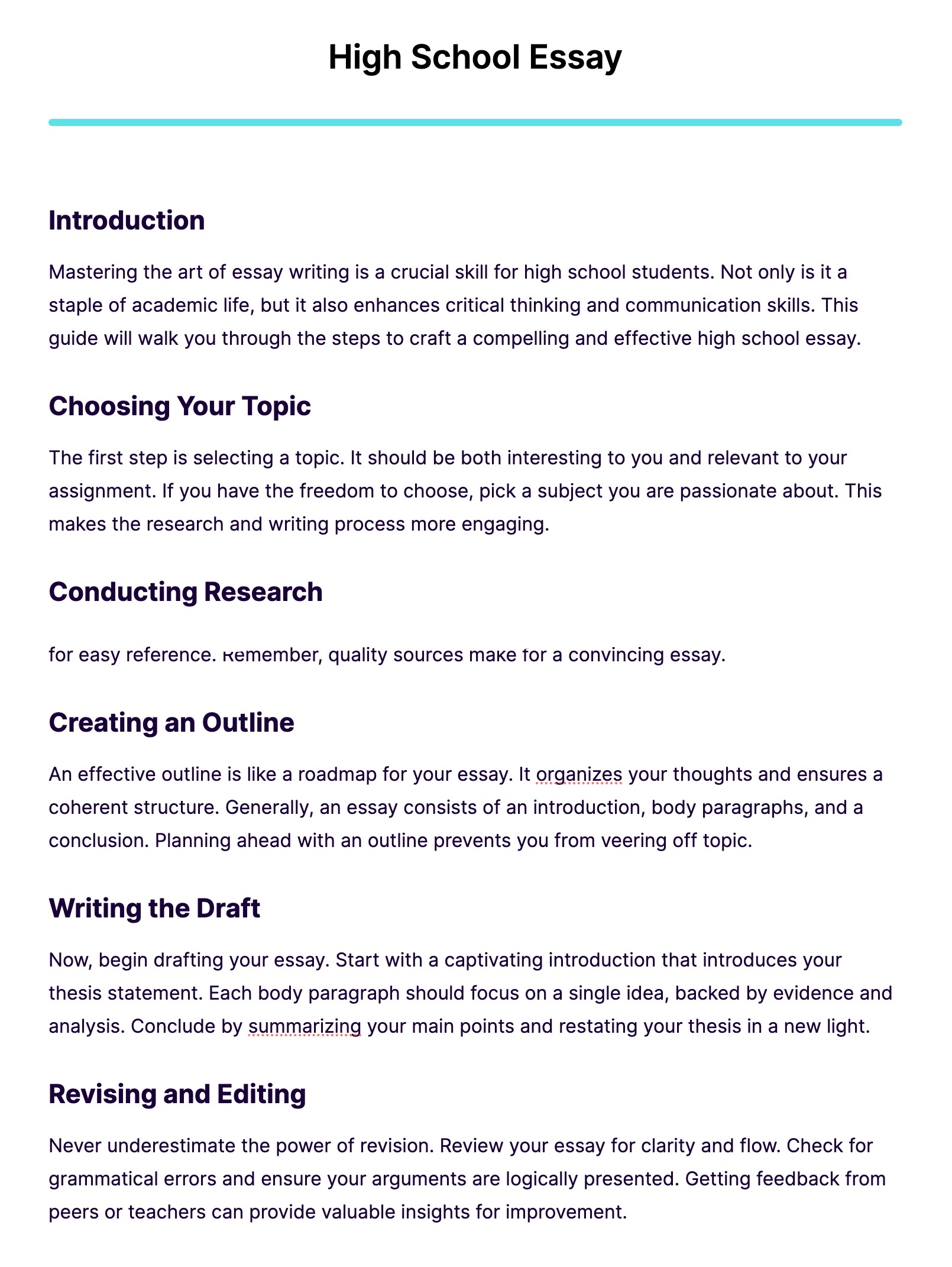
Free Download
High School Essay For Students
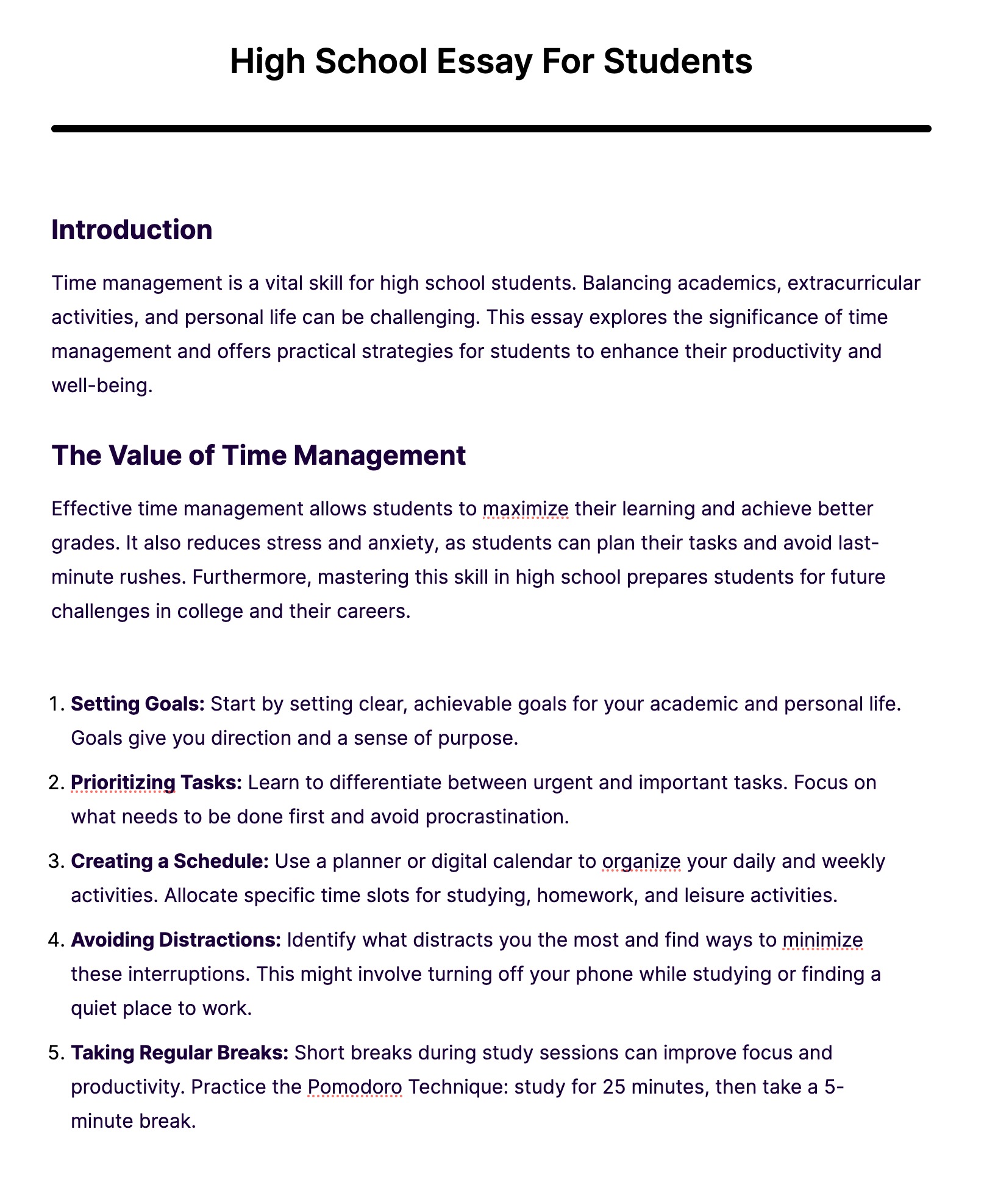
High School Essay Outline
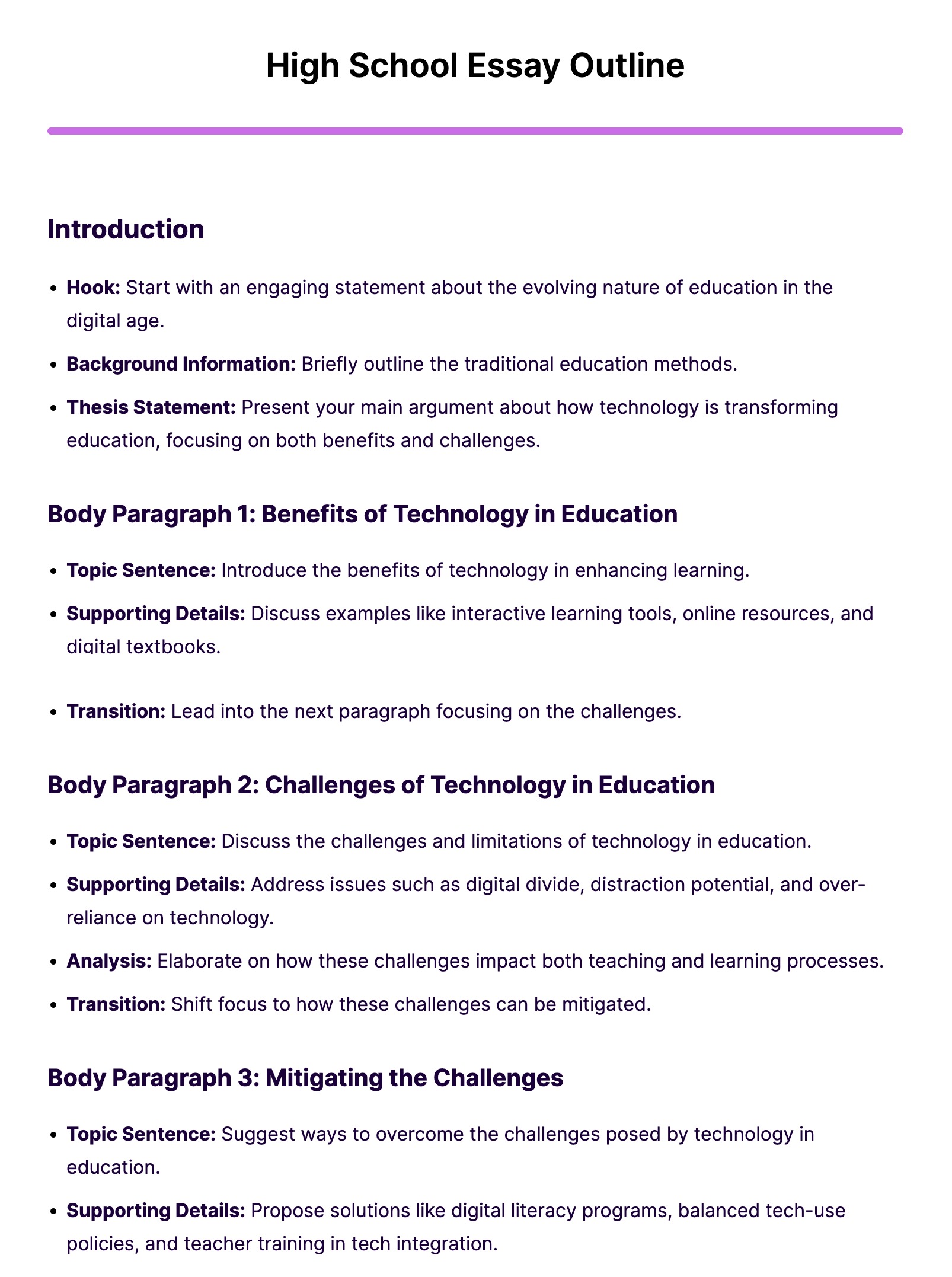
High School Essay Example
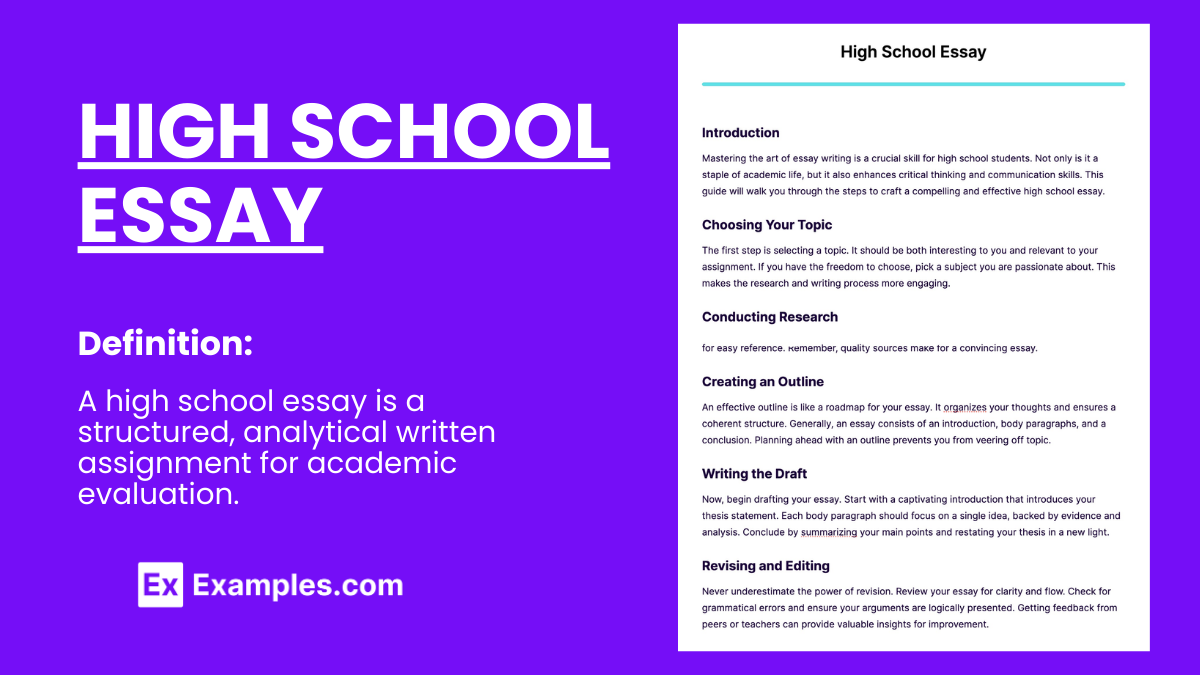
High School Self Introduction Essay Template
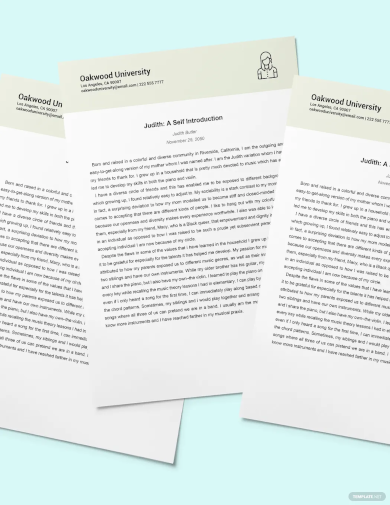
High School Student Essay
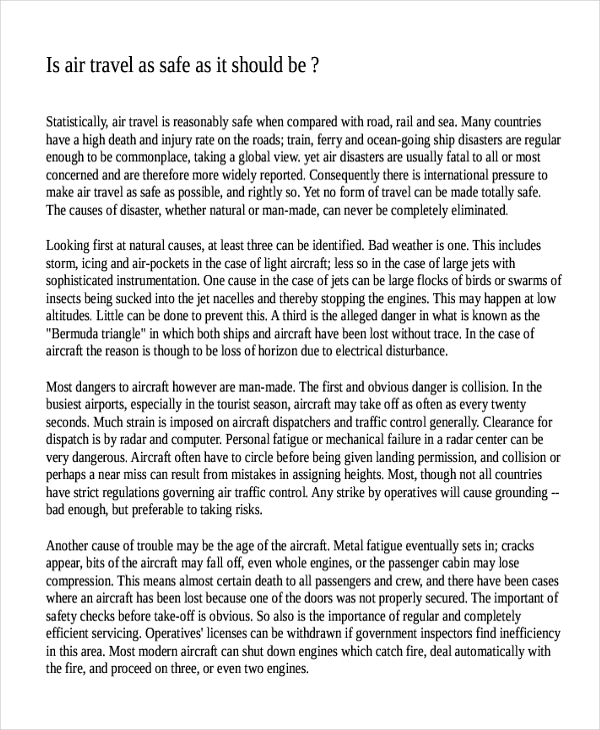
englishdaily626.com
Reflective High School
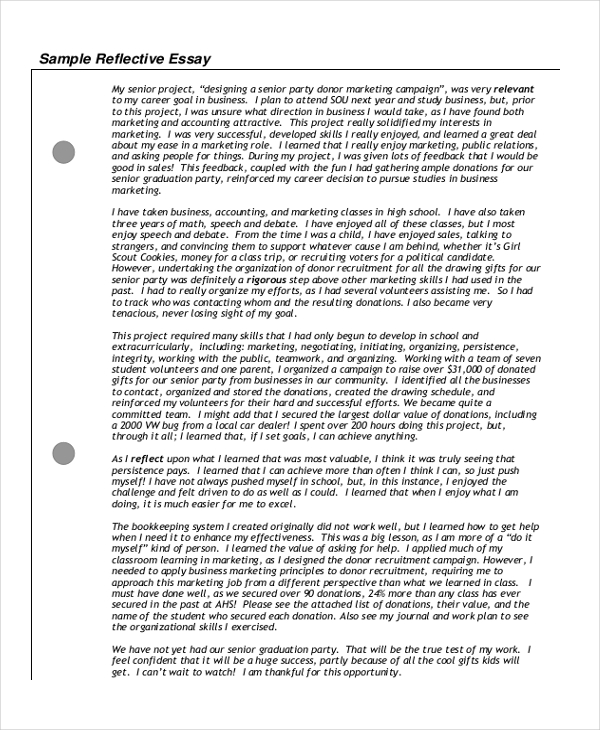
oregoncis.uoregon.edu
Argumentative Essays for High School
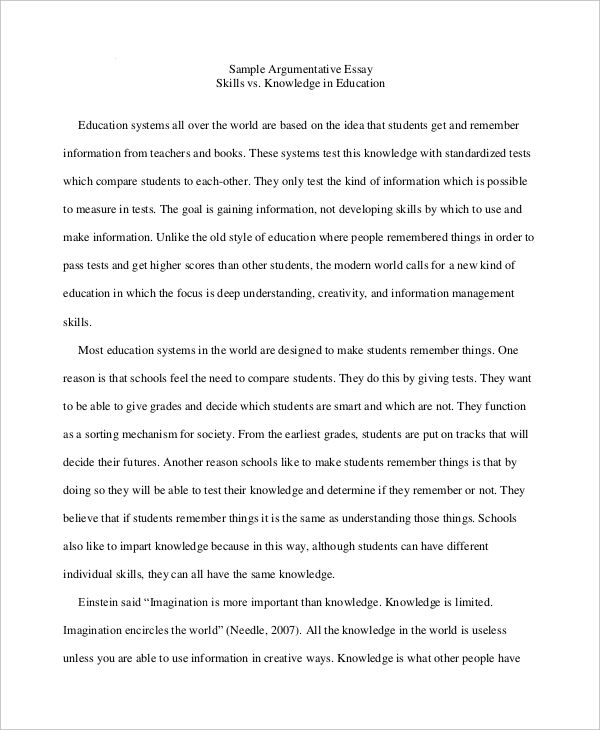
Informative Essays for High School
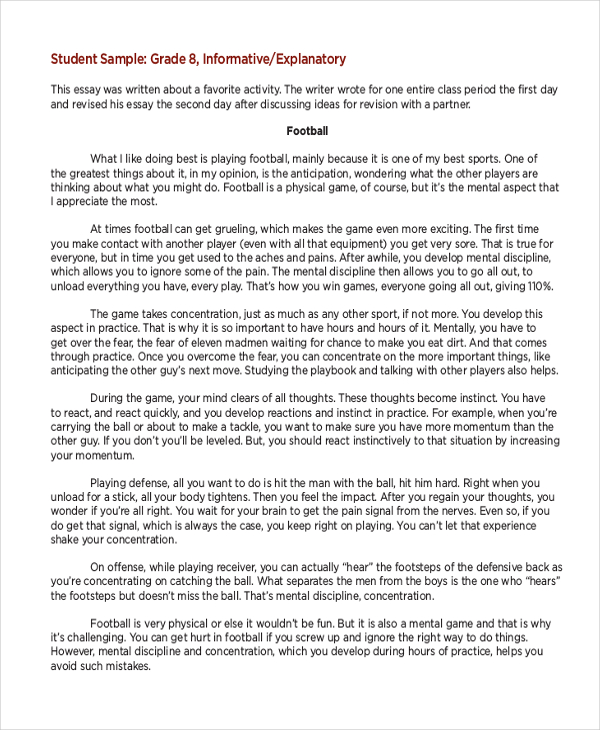
High School Persuasive
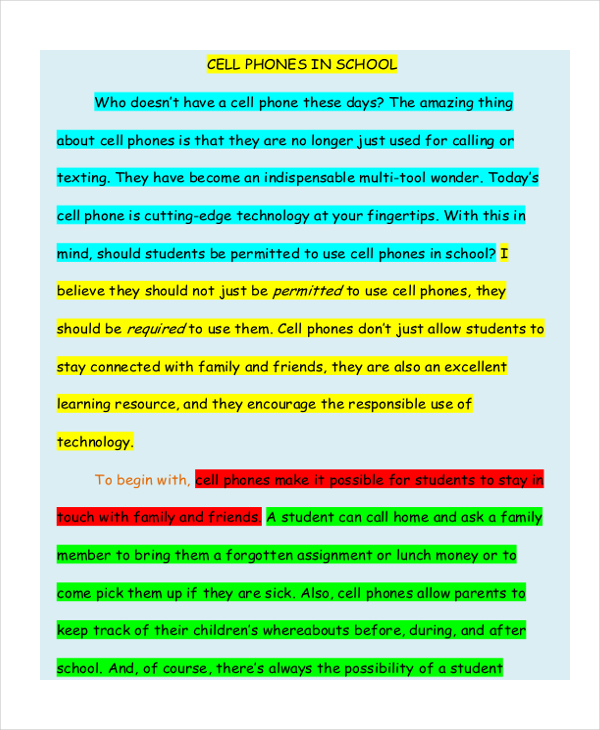
writecook.com
Narrative Essays
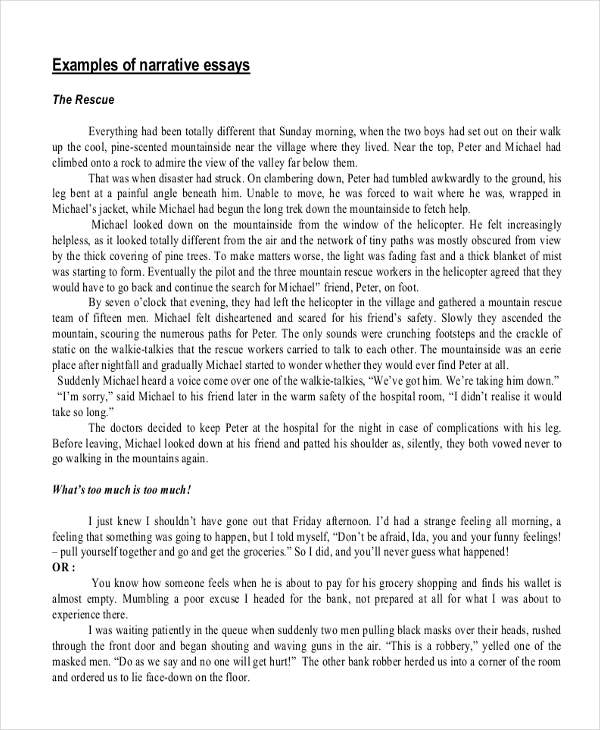
Scholarship Essays
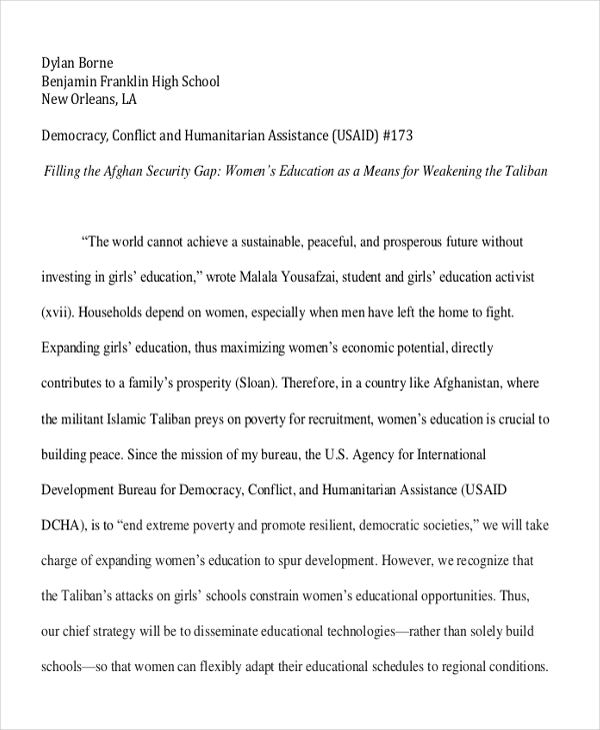
High School Application
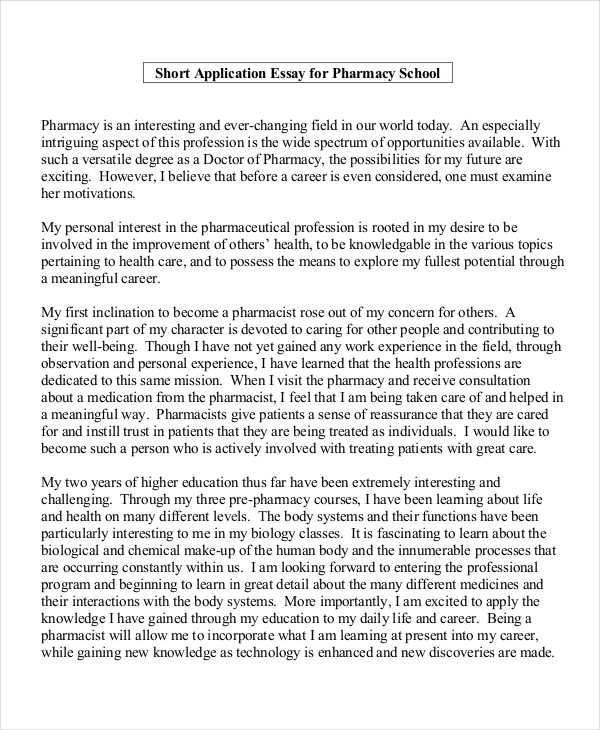
e-education.psu.edu
High School Graduation Essay
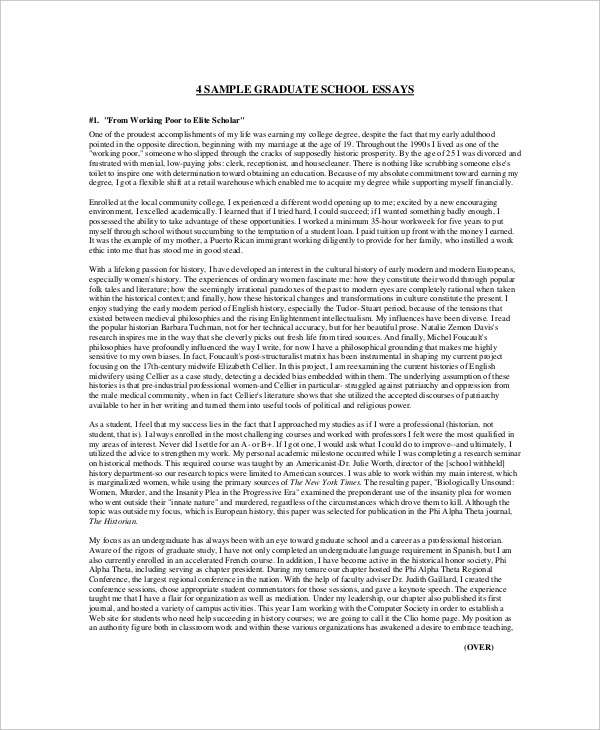
High School Leadership Essay
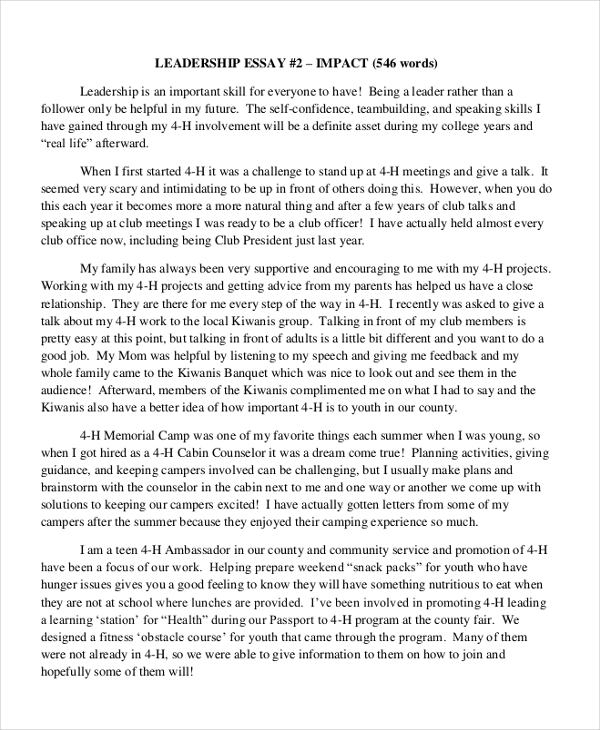
web.extension.illinois.edu
How to Write a High School Essay
Some teachers are really not that strict when it comes to writing essay because they too understand the struggles of writing stuff like these. However, you need to know the basics when it comes to writing a high school essay.
1. Understand the Essay Prompt
- Carefully read the essay prompt or question to understand what’s required. Identify the type of essay (narrative, persuasive, expository, etc.) and the main topic you need to address.
2. Choose a Topic
- If the topic isn’t provided, pick one that interests you and fits the essay’s requirements. Make sure it’s neither too broad nor too narrow.
3. Conduct Research (if necessary)
- For expository, argumentative, or research essays, gather information from credible sources to support your arguments. Take notes and organize your findings.
4. Create an Outline
- Outline your essay to organize your thoughts and structure your arguments effectively. Include an introduction, body paragraphs, and a conclusion.
5. Write the Introduction
- Start with a hook to grab the reader’s attention (a quote, a question, a shocking fact, etc.). Introduce your topic and end the introduction with a thesis statement that presents your main argument or purpose.
6. Develop Body Paragraphs
- Each body paragraph should focus on a single idea or argument that supports your thesis. Start with a topic sentence, provide evidence or examples, and explain how it relates to your thesis.
7. Write the Conclusion
- Summarize the main points of your essay and restate your thesis in a new way. Conclude with a strong statement that leaves a lasting impression on the reader.
Types of High School Essay
1. narrative essay.
Narrative essays tell a story from the writer’s perspective, often highlighting a personal experience or event. The focus is on storytelling, including characters, a setting, and a plot, to engage readers emotionally. This type allows students to explore creativity and expressiveness in their writing.
2. Descriptive Essay
Descriptive essays focus on detailing and describing a person, place, object, or event. The aim is to paint a vivid picture in the reader’s mind using sensory details. These essays test the writer’s ability to use language creatively to evoke emotions and bring a scene to life.
3. Expository Essay
Expository essays aim to explain or inform the reader about a topic in a clear, concise manner. This type of essay requires thorough research and focuses on factual information. It’s divided into several types, such as compare and contrast, cause and effect, and process essays, each serving a specific purpose.
4. Persuasive Essay
Persuasive essays aim to convince the reader of a particular viewpoint or argument. The writer must use logic, reasoning, and evidence to support their position while addressing counterarguments. This type tests the writer’s ability to persuade and argue effectively.
5. Analytical Essay
Analytical essays require the writer to break down and analyze an element, such as a piece of literature, a movie, or a historical event. The goal is to interpret and make sense of the subject, discussing its significance and how it achieves its purpose.
6. Reflective Essay
Reflective essays are personal pieces that ask the writer to reflect on their experiences, thoughts, or feelings regarding a specific topic or experience. It encourages introspection and personal growth by examining one’s responses and learning from them.
7. Argumentative Essay
Similar to persuasive essays, argumentative essays require the writer to take a stance on an issue and argue for their position with evidence. However, argumentative essays place a stronger emphasis on evidence and logic rather than emotional persuasion.
8. Research Paper
Though often longer than a typical essay, research papers in high school require students to conduct in-depth study on a specific topic, using various sources to gather information. The focus is on presenting findings and analysis in a structured format.
Tips for High School Essays
Writing a high school essay if you have the tips on how to do essay effectively . This will give you an edge from your classmates.
- Stay Organized: Keep your notes and sources well-organized to make the writing process smoother.
- Be Clear and Concise: Avoid overly complex sentences or vocabulary that might confuse the reader.
- Use Transitions: Ensure that your paragraphs and ideas flow logically by using transition words and phrases.
- Cite Sources: If you use direct quotes or specific ideas from your research, make sure to cite your sources properly to avoid plagiarism.
- Practice: Like any skill, essay writing improves with practice. Don’t hesitate to write drafts and experiment with different writing styles.
Importance of High School Essay
Aside from the fact that you will get reprimanded for not doing your task, there are more substantial reasons why a high school essay is important. First, you get trained at a very young age. Writing is not just for those who are studying nor for your teachers. As you graduate from high school and then enter college (can see college essays ), you will have more things to write like dissertations and theses.
At least, when you get to that stage, you already know how to write. Aside from that, writing high essays give a life lesson. That is, patience and resourcefulness. You need to find the right resources for your essay as well as patience when finding the right inspiration to write.
How long is a high school essay?
A high school essay typically ranges from 500 to 2000 words, depending on the assignment’s requirements and the subject matter.
How do you start a personal essay for high school?
Begin with an engaging hook (an anecdote, quote, or question) that introduces your theme or story, leading naturally to your thesis or main point.
What makes a good high school essay?
A good high school essay features a clear thesis, coherent structure, compelling evidence, and personal insights, all presented in a polished, grammatically correct format.
Text prompt
- Instructive
- Professional
Write a High School Essay on the importance of participating in sports.
Discuss the role of student government in high schools in a High School Essay.
Peer Review Checklist
Janelle schwartz, english 201.
This is to give you an idea of the type of things you should be looking for and accomplishing in both your own paper and that of your peer(s). Use what follows as a kind of checklist for determining what is working effectively in a paper and what is not.
Introduction
Has the writer (either yourself or your classmate) clearly expressed the question (major claim, thesis) that he/she has selected to analyze? What is that question?
Is there any unnecessary information included in the introduction?
Having read the entire essay, suggest an alternate way to begin the essay.
Having read the entire essay, does the introduction fit the paper?
What are the main points that are being made in each paragraph? Briefly outline the point of each paragraph and sketch the evidence given in support for each.
How is the evidence linked to the main point of the paragraph? And to the main point of the essay?
Is there any unnecessary information throughout the body of the paper, such as plot summary, excessive quotation,
or unsupported claims?
Has the writer restated (not simply repeated) the major claim of the paper in light of its discussion throughout the paper? In other words, what should the reader have learned by the end of the argument?
What is your understanding of the initial question after reading the paper? Has this understanding been adequately expressed? And does it open up the major claim to the question of its implications? (Has this major claim ultimately been placed into a broader perspective or context?)
Suggest an alternate ending to the argument. General/Misc
Suggest an alternate title. Does it express “in a nutshell” the essay’s theme? Has it followed the proper “title: subtitle” format? [Note: This assumes the paper already has a title—thus, every paper must have a title!]
What confuses you about the draft? (For example, a certain word choice, the topic and/or its presentation, the explanation of something in particular.)
Does the flow of the essay break down at any point? In other words, does the essay become hard to read or lose its coherence? Where? And how might you fix it?
Does the essay remain within the chosen text(s)? If there are any generalizations, speculations, clichés, idiomatic expressions, or colloquialisms, underline them so that you can point them out to your peer(s).
What has the writer done well in his/her essay? Provide positive comments about the strength(s) of the essay.
Have a language expert improve your writing
Run a free plagiarism check in 10 minutes, generate accurate citations for free.
- Knowledge Base
- Checklist for academic essays | Is your essay ready to submit?
Checklist for Academic Essays | Is Your Essay Ready to Submit?
Published on December 2, 2014 by Shane Bryson . Revised on July 23, 2023.
An academic essay is a focused piece of writing that aims to present a convincing argument using evidence, analysis and interpretation. It always has an introduction , a main body, and a conclusion .
When you’ve finished writing your essay, use this checklist to evaluate your work.
Instantly correct all language mistakes in your text
Upload your document to correct all your mistakes in minutes

Table of contents
Other interesting articles, checklist: essay.
My essay follows the requirements of the assignment (topic and length ).
My introduction sparks the reader’s interest and provides any necessary background information on the topic.
My introduction contains a thesis statement that states the focus and position of the essay.
I use paragraphs to structure the essay.
I use topic sentences to introduce each paragraph.
Each paragraph has a single focus and a clear connection to the thesis statement.
I make clear transitions between paragraphs and ideas.
My conclusion doesn’t just repeat my points, but draws connections between arguments.
I don’t introduce new arguments or evidence in the conclusion.
I have given an in-text citation for every quote or piece of information I got from another source.
I have included a reference page at the end of my essay, listing full details of all my sources.
My citations and references are correctly formatted according to the required citation style .
My essay has an interesting and informative title.
I have followed all formatting guidelines (e.g. font, page numbers, line spacing).
Your essay meets all the most important requirements. Our editors can give it a final check to help you submit with confidence.
Receive feedback on language, structure, and formatting
Professional editors proofread and edit your paper by focusing on:
- Academic style
- Vague sentences
- Style consistency
See an example

If you want to know more about AI tools , college essays , or fallacies make sure to check out some of our other articles with explanations and examples or go directly to our tools!
- Ad hominem fallacy
- Post hoc fallacy
- Appeal to authority fallacy
- False cause fallacy
- Sunk cost fallacy
College essays
- Choosing Essay Topic
- Write a College Essay
- Write a Diversity Essay
- College Essay Format & Structure
- Comparing and Contrasting in an Essay
(AI) Tools
- Grammar Checker
- Paraphrasing Tool
- Text Summarizer
- AI Detector
- Plagiarism Checker
- Citation Generator
Cite this Scribbr article
If you want to cite this source, you can copy and paste the citation or click the “Cite this Scribbr article” button to automatically add the citation to our free Citation Generator.
Bryson, S. (2023, July 23). Checklist for Academic Essays | Is Your Essay Ready to Submit?. Scribbr. Retrieved August 12, 2024, from https://www.scribbr.com/academic-essay/essay-checklist/
Is this article helpful?
Shane Bryson
Shane finished his master's degree in English literature in 2013 and has been working as a writing tutor and editor since 2009. He began proofreading and editing essays with Scribbr in early summer, 2014.
Get unlimited documents corrected
✔ Free APA citation check included ✔ Unlimited document corrections ✔ Specialized in correcting academic texts
Ultimate Checklist for Fall of Senior Year in High School
🍂 how should i prepare for college applications in senior year.
During the fall, you'll want to make sure you manage your time well. You will be busy with college applications, extracurriculars, and APs. Remember to take time for self-care and spending time with family and friends during this lovely fall season too.
🌐 Connect with Your Support Network
👩🏫 Ask for letters of recommendation (varies per school and student)
For some schools, you are required to ask for letters of recommendation during junior spring. But for others, it happens during the beginning of the school year. Ask your teachers for a letter at least one month before your first college's deadline. Go up to them in person (email if not possible) and ask if they can write a strong letter of recommendation for you. It is best to go alone and when your teacher is free! This way, your teacher can be the most honest with you. If they say no, it's not a reflection of you. It's often because either the teacher is too busy or is unable to write a strong letter. When a teacher says no, it's actually better because you can find a teacher who can write a positive letter! Teachers don't get paid extra to do this, so remember to be polite all throughout. Send them any additional material they need, such as "brag sheets" and resumes.
It's advised to pick a teacher who can write about your growth and how you are as a person. This is preferred over a teacher who can write about your stellar grades and ability to listen.
When choosing teachers, make sure you list the requirements of each college when doing college research. The standard is two teachers, one from STEM and one from the humanities. Each college varies, from the number of letters they want to the subject the teacher teaches.
In addition, most colleges allow students to submit an optional "other" letter of recommendation. These include clergy, coaches, college access counselors, employers, club advisors, and others. Not all colleges recommend this optional letter, so do your research. Furthermore, each letter should provide a different perspective. You won't be able to read your recommenders' letters due to FERPA rights. Regardless, you should have an understanding of what type of letter each recommender will provide.
👥 Meet with your guidance counselor regarding college applications and scholarships, including letters of recommendation
Your guidance counselor often has a list of many scholarships, both local and national. By meeting with your counselor, you can retrieve this list early and prepare for writing these essays. Pro-tip : you don't have to write new essays for each scholarship and college! Often, these prompts intersect and you can use the same essay and/or revise and personalize.
Counselors are required to write a school report and a recommendation letter for you. Make sure to get in touch with your counselor and invite them to your Common/Coalition Application portal.
📝 Finalize Your List and Create an Essay Plan
🕜 Start finalizing your college list and consider which schools you want to apply to early
- Early action, early decision, and single-choice/restrictive early actions are the three main application plans for early application. Through early applications, you get your decision earlier. In this case, the essays are also due earlier. Make sure to write the deadlines for each college you're applying to in your calendar!
- Applying early is an important decision, as the quality of your essays improves over time. If you don't think your essays are ready and rushed, it might not be best to apply early.
- For public universities , early action provides a benefit: a source of demonstrated interest. Since early decision is binding (you must attend if accepted), colleges see this as demonstrated interest. This gives a boost to the application. Still, early decision is often criticized for its lack of financial aid. Make sure you speak to your family before applying early decision.
Check out this page for some Early Action (EA) and Early Decision (ED) Tips.
📅 Categorize your essays and create an essay writing plan
Once you've figured which colleges to apply to, copy and paste all the essay prompts you have to answer. Most of the time, you can find categories that you can split each prompts into. Some examples include:
- Why this college (normally in consideration of its offerings)
- Why you... essay (why you fit this college)
- Extracurricular essay
- Identity essay
- Community essay
✏️ The Essay Planner template
Here are the columns you could put on a table to plan your essays:
Under tags, you could put something like "Supplemental Essays"
There are some other types, but by splitting them up, you can manage your time more effectively. You will do brainstorming for only a few topics rather than for each one individually. You can also often search for tips for each type of essay online.
Once you've brainstormed for each category, decide how to personalize each essay. Here, choose which topics are best for you as an applicant!
Next to each essay prompt, you should also write its deadline. Then, you can figure out how you want to split the essays up. The early applications should be completed first, but remember that your essay writing gets better over time.
✍🏼 Refine your main essay and start writing supplemental essays
You should also revise and edit your essays! Once you finish, let the essay sit for a few days, then come back to it. You'll revisit it with a fresh perspective! Also, let trusted individuals edit and revise your essays. Reach out to mentors, guidance counselors, and English teachers. Family members are not recommended because you want a more objective viewpoint. The admissions officer doesn't know you personally. At the end of the day, it is up to you, and who you trust!
🤑 Complete Financial Aid Forms and Scholarship Applications
There are often deadlines for financial aid, so make sure you turn it in on time! Read through the Fiveable financial aid page to get a list of scholarships, understand how to start the scholarship search, apply for scholarships, and complete financial aid forms.
Guide Outline
Related content, first-gen: preparing for the college application, what extracurriculars should high school sophomores do, college checklist: what to accomplish in your junior year, 5 goals for your freshman year of high school, 10 goals for your freshman year of high school, college essay tips for first-gen students.
.png)
Stay Connected

IEW® in High School

The high school years can be daunting, but writing does not have to be. IEW teaches students how to navigate the essays, research papers, and literary analysis that they will need to succeed in high school and beyond. IEW’s pathway for high school is designed to help beginning students gain confidence while continuing to bring new insights and challenges to those who have many years of IEW experience.

Structure and Style ® for Students: Year 1 Level C
In this course, join Andrew Pudewa as he leads students on a 24-week writing journey using IEW’s Structure and Style approach. Students reading at a 9th grade level or higher will take delight in Mr. Pudewa’s humorous, incremental, and effective writing lessons. The curriculum provides clear daily assignments and includes vocabulary words, literature suggestions, and lesson plans for teachers. Easy to use and affordable, Structure and Style for Students brings a successful solution to your writing lessons—guaranteed! Try three weeks free !
Structure and Style ® for Students: Year 2 Level C
Take students to the next level in their Structure and Style writing journey! Twenty-four more weeks of incredible writing instruction await with the humorous and engaging Andrew Pudewa. Students who have completed Year 1 Level C and are ready for their second year of the Structure and Style for Students video course will enjoy reviewing and refining the nine previously learned IEW units and response to literature, then pressing on into full literary analysis. The curriculum provides clear daily assignments and includes vocabulary words, literature suggestions, and lesson plans for teachers. Easy to use and affordable, the second year of Structure and Style for Students builds on the skills learned in the previous video course and brings a successful solution to your writing lessons—guaranteed!

University-Ready Writing
In this twelve-week video course, high school and college students learn effective note-taking strategies as they write précis (summaries) and essays, tackling assignments of varying lengths from one paragraph to several pages. With tips and tools for writing an abstract, creating and arranging content, citing sources, applying various style guides, using literary devices, and writing on-demand essays, this curriculum will prepare your students for university writing assignments. Try two weeks free !
Introduction to Public Speaking
In this twelve-week course, middle- and high-school students learn memory and delivery techniques as they write and present five speeches: self-introductory, narrative, expository, persuasive, and impromptu. Students evaluate recorded speeches in preparation for self-evaluation. This self-explanatory program empowers teachers to help students become competent and confident public speakers. Try two weeks free !
Advanced U.S. History-Based Writing Lessons†
Follow the course of U.S. history from Explorers to Modern Times while learning to write with structure and style.
Bible-Based Writing Lessons†
Delve into Bible stories and themes while learning to write with structure and style.
Phonetic Zoo Spelling Level C
Looking for a new approach to spelling? This phonics-based program uses auditory input to ensure that the correct spelling of each word is absorbed by the brain. The audio allows students to work independently much of the time while allowing for the repetition needed for mastery.
† Contains distinctly Christian content
What might a pathway look like for a student starting out with IEW in ninth grade?
If your student is reading at grade level, we recommend starting with the Structure and Style for Students: Year 1 Level C Premier package for you and your student in ninth grade. Tenth grade would be a good time to use Windows to the World taught in conjunction with Teaching the Classics or taught as a one-semester class paired with Introduction to Public Speaking. For eleventh grade, use Structure and Style for Students: Year 2 Level C. Andrew Pudewa discusses additional options for your high school student in his conference talk Hacking High School: Rethinking the Teen Years . Grammar, spelling, public speaking, and entrepreneurship can be added as well. Call, chat, or email us for additional support with making decisions!
I have a high school senior. Where should I start with IEW to make sure he gets as much writing instruction as possible before graduation?
Structure and Style for Students: Year 1 Level C provides a solid foundation in writing while also expanding into more advanced essay models such as research papers and persuasive essays. Take it one step further and hone your student’s grammar expertise before he enters college or the workforce. Fix It!™ Grammar will provide you with a full-year grammar course. In the Fix It! Grammar language arts and grammar curriculum, students internalize the rules instead of just memorizing them. That’s because Fix It! Grammar encourages students to critically analyze an ongoing story by searching for and fixing embedded errors, and in the process, students incorporate accurate punctuation and correct grammar more easily into their own compositions. To ensure you start the program at your student’s level of ability, we recommend reviewing the skills listed for each level on the Fix It! Grammar landing page.
Does IEW count as a full high school English credit?
High school credits vary depending on where you live. Please check with your state homeschool organization for the best way to calculate credits for your particular student. English encompasses communication skills: composition (writing), literature, public speaking, grammar, and may also include vocabulary and spelling. You will need to make sure you are covering all of the requirements for your state . Lee Binz with www.homehighschoolhelp.com understands the difficulty in creating high school transcripts and is dedicated to providing parents with specific beneficial answers to transcript questions. If you have questions about high school credits and transcripts, we encourage you to contact her . She will be happy to help.
Is IEW for High School? webinar
De-Confusing Essays article
Six Calming Answers to Six Panicky Questions about High School English for Homeschoolers article
Hacking High School: Rethinking the Teen Years – presentation by Andrew Pudewa
Most of us have presuppositions about what high school is based on our own experience. Times are changing, and the opportunities for home educating high schoolers have grown rapidly. Many of these opportunities will save time, help your family avoid higher education debt, and give your teens a head start on their next decade of life. Watch or listen at IEW.com/HHS

Dual Enrollment through CHI – College Credit Using IEW Materials
IEW high school students can receive college credit for English Composition I and II from a fully accredited university through Christian Halls International. Learn more at IEW.com/CHI

Classic Learning Test – Standardized Test
Classic Learning Test (CLT) exams serve as an alternative to Common Core-based assessments and help to highlight the unique strengths of homeschool, private school, or charter school students. CLT exams are accepted at over two hundred colleges! Find out more by visiting IEW.com/CLT and get a CLT discount code!
JournalBuddies.com

Journal Buddies Jill | August 10, 2024 December 14, 2022 | Writing by Grade Level , Prompts by Grade
50 Great Essay Topics for High School Students (Updated)
Essay Topics for High School Students to Practice Writing Personal Essays- — Plus, 15 NEW bonus essay ideas and 11 personal writing ideas for writers of all ages.

Yes, it’s true. Our personal essay topics for High School students may be used by high schoolers AND by college students, young adults, or writers of any age.
So, welcome!
If you need inspiration for your next personal essay homework assignment or for your personal narratives, then you have come to the right place. Read on to discover more.
Yes, We Have Personal Persuasive Essay Topics and Ideas
If they haven’t already, high school students will quickly become accustomed to writing essays—to which I say, the more writing they do, the better.
That’s because high schoolers will ultimately need to write personal essays for everything from college applications to standardized tests, so it’s essential to make sure the kids in your class are getting enough time to practice and refine their essay writing skills.
As your writers answer the 35 essay topics for high school students below, they should plan to write personal essays of about 300-1000 words in response.
Covering topics like communication, rites of passage, ethical consumption, and more, your students will have the chance to explore issues that they and their peers face each day—all within the safe confines of the page.
Most importantly, your essay writers will reflect, grow, and prepare for the long road ahead all at the same time.
Ok, use these writing prompts and essay topics for high school students today. By doing so, you’ll help the teens in your classroom get better at personal essay writing and more skilled at expressing their deepest thoughts and ideas. Take a look and enjoy!
35 Personal Essay Topics for High School Students
- What inspires you?
- What inanimate object best embodies you?
- What kind of person do you want to be—and what kind of person are you now?
- What makes you proud?
- What do your parents not understand about you?
- Describe a rite of passage you’ve completed and what it meant to you.
- What is the most important quality a person can have?
- Write about a lesson you recently learned—and how it changed your outlook on things.
- How has the place where you’ve grown up impacted who you are?
- Write about the first time you felt different or alone.
- What is the best decision you ever made?
- What is something you could change about yourself that would make a major difference in your life?
- What kind of impact does peer pressure have on your life?
- Are you adventurous? Compare and contrast a time when you took a risk and a time when you played it safe.
- Write about a time when someone told you something about yourself that changed your perspective.
- Write about a challenge you’re facing right now—and what you plan to do about it.
- When do you find it hardest to make good decisions? Why?
- Are you comfortable in your body? How do media and culture affect your perception of how you look?
- Write about the first time when you felt pressured to adhere to a particular gender role.
- Do you identify as a feminist? Why or why not?
- Do you consider yourself to be spiritual or religious at all? Why or why not?
- What does “ethical consumption” mean to you—and does it matter to you?
- What role does social media play in your life? Write about its influence—or lack thereof.

- Why do you think our culture fixates so heavily on celebrity gossip?
- How do you and your friends communicate with each other?
- What period of school (elementary school, middle school, high school, or college) do you feel is most important? Why?
- Do you feel like you and your classmates are honest with each other? Why or why not?
- What issue truly motivates you—and why?
- Do you believe in “best” friends? Why or why not?
- What is the most important thing in the world to you?
- If you were a college admissions officer, what qualities would you look for in prospective students?
- Write about a time when you were tested—and how you handled the tough situation.
- When you look back on high school someday, what part will you remember fondly? Which part will you wish you could forget?
- What is your greatest dream? Do you feel like you’ll ever achieve it?
I hope you enjoyed this list of essay topics for High School students and are able to create some amazing works of art from the topic of your choice.
15 More Essay Topics for High School Students
A teenager in today’s world hoping to get good grades with an interesting essay may opt to write about topics from the news, current affairs, or personal interest. Here are some themes they could explore from their unique point of view:
- Internet (see 50 privacy essay topics here)
- Climate change and global warming (see our list of 53 Earth and Environmental prompts )
- Obesity in the United States
- Immigration, illegal immigrants, and a path to becoming a citizen
- Cell phones
- Contrast essays (here are 31 Fun Compare and Contrast ideas )
- Changes over the past decade
- Stereotype changes in history
- Exploration of healthcare
- College education costs
- Keeping exotic animals in captivity for personal use
- The ethics of keeping wild animals in zoos
- Selling a piece of art as an NFT
- Implementing school uniforms in public schools in America
So get to it and use these essay topics for high school students from my blog in your next assignment for your high school students.
11 Personal Writing Ideas
And, if you still need a different prompt to help you get inspired, take a look at this list of 11 personal writing ideas:
- Write a personal statement about yourself, your beliefs, values, and the morals you choose to live by.
- What is the most beautiful place you have ever experienced and why?
- What is your biggest fear?
- What are the most difficult decisions you’ve had to make in your life thus far?
- What is the one wrong choice you wish you could go back and change and why?
- What is the bravest moment in your life?
- What new understanding do you highly value and how did you learn it?
- What about your childhood is significant so much so that you want others to know all about it?
- What movie mirrors your life?
- What is the ugliest thing you’ve ever experienced in your life and what did you learn from it?
- What accomplishment are you the proudest of and what talent do you think helped you achieve what you did?
Helpful Links & Resources
Take a look at these free writing resources:
- Personal Narrative Essay Topics Listed by Grade
- Argumentative Essay Prompt Ideas for High Schoolers
- Descriptive Essay Topics
- 30 Examples of Topic Sentences (by grade level)
- Top 10 Research Topics for Students
- 24 Forward-Thinking Research Topic Ideas for Students
- Essay plagiarism checker
Until next time, write on…
If you enjoyed these Essay Topics for High School Students , please share them on Facebook, Twitter, and/or Pinterest. I appreciate it!
Sincerely, Jill journalbuddies.com creator and curator

Tap to See Prompts 15 Free First Day of School Writing Activities 75 Upbeat Writing Prompts about School 51 Great Back to School Writing Prompts ------------Start of Om Added --------- @media (min-width: 320px) and (max-width: 767px) { .inside-right-sidebar { display: none !important; } } Search Now Offering You 19,000+ Prompts!

Tap to See Prompts 15 Free First Day of School Writing Activities 75 Upbeat Writing Prompts about School 51 Great Back to School Writing Prompts Grade 1 Grade 2 Grade 3 Grade 4 Grade 5 Grade 6 Grade 7-8 Grade 9-12 All Ages ------------End of Om Added --------- Tags Essay Prompts , Essay Topics , essay writing , essays , Grade 9-12 , High School , high school students , high-schholers , new essay prompts , personal essay writing , Personal Essays , prompts for high school essay , students , teens , write , writing , writing essays , writing prompts div#postbottom { margin-top: 12px; } Search Now Offering You 19,000+ Prompts!
- Grades 6-12
- School Leaders
Free Attendance Questions Slideshow ✨
The Big List of Essay Topics for High School (120+ Ideas!)
Ideas to inspire every young writer!

High school students generally do a lot of writing, learning to use language clearly, concisely, and persuasively. When it’s time to choose an essay topic, though, it’s easy to come up blank. If that’s the case, check out this huge round-up of essay topics for high school. You’ll find choices for every subject and writing style.
- Argumentative Essay Topics
- Cause-and-Effect Essay Topics
- Compare-Contrast Essay Topics
- Descriptive Essay Topics
- Expository and Informative Essay Topics
- Humorous Essay Topics
Literary Essay Topics
- Narrative and Personal Essay Topics
- Personal Essay Topics
- Persuasive Essay Topics
Research Essay Topics
Argumentative essay topics for high school.
When writing an argumentative essay, remember to do the research and lay out the facts clearly. Your goal is not necessarily to persuade someone to agree with you, but to encourage your reader to accept your point of view as valid. Here are some possible argumentative topics to try. ( Here are 100 more compelling argumentative essay topics. )
- The most important challenge our country is currently facing is … (e.g., immigration, gun control, economy)
- The government should provide free internet access for every citizen.
- All drugs should be legalized, regulated, and taxed.
- Vaping is less harmful than smoking tobacco.
- The best country in the world is …
- Parents should be punished for their minor children’s crimes.
- Should all students have the ability to attend college for free?
- Should physical education be part of the standard high school curriculum?

WeAreTeachers
- Schools should require recommended vaccines for all students, with very limited exceptions.
- Is it acceptable to use animals for experiments and research?
- Does social media do more harm than good?
- Capital punishment does/does not deter crime.
- What one class should all high schools students be required to take and pass in order to graduate?
- Do we really learn anything from history, or does it just repeat itself over and over?
- Are men and women treated equally?
Cause-and-Effect Essay Topics for High School
A cause-and-effect essay is a type of argumentative essay. Your goal is to show how one specific thing directly influences another specific thing. You’ll likely need to do some research to make your point. Here are some ideas for cause-and-effect essays. ( Get a big list of 100 cause-and-effect essay topics here. )
- Humans are causing accelerated climate change.
- Fast-food restaurants have made human health worse over the decades.
- What caused World War II? (Choose any conflict for this one.)
- Describe the effects social media has on young adults.

- How does playing sports affect people?
- What are the effects of loving to read?
- Being an only/oldest/youngest/middle child makes you …
- What effect does violence in movies or video games have on kids?
- Traveling to new places opens people’s minds to new ideas.
- Racism is caused by …
Compare-Contrast Essay Topics for High School
As the name indicates, in compare-and-contrast essays, writers show the similarities and differences between two things. They combine descriptive writing with analysis, making connections and showing dissimilarities. The following ideas work well for compare-contrast essays. ( Find 80+ compare-contrast essay topics for all ages here. )
- Public and private schools
- Capitalism vs. communism
- Monarchy or democracy
- Dogs vs. cats as pets

- Paper books or e-books
- Two political candidates in a current race
- Going to college vs. starting work full-time
- Working your way through college as you go or taking out student loans
- iPhone or Android
- Instagram vs. Twitter (or choose any other two social media platforms)
Descriptive Essay Topics for High School
Bring on the adjectives! Descriptive writing is all about creating a rich picture for the reader. Take readers on a journey to far-off places, help them understand an experience, or introduce them to a new person. Remember: Show, don’t tell. These topics make excellent descriptive essays.
- Who is the funniest person you know?
- What is your happiest memory?
- Tell about the most inspirational person in your life.
- Write about your favorite place.
- When you were little, what was your favorite thing to do?
- Choose a piece of art or music and explain how it makes you feel.
- What is your earliest memory?

- What’s the best/worst vacation you’ve ever taken?
- Describe your favorite pet.
- What is the most important item in the world to you?
- Give a tour of your bedroom (or another favorite room in your home).
- Describe yourself to someone who has never met you.
- Lay out your perfect day from start to finish.
- Explain what it’s like to move to a new town or start a new school.
- Tell what it would be like to live on the moon.
Expository and Informative Essay Topics for High School
Expository essays set out clear explanations of a particular topic. You might be defining a word or phrase or explaining how something works. Expository or informative essays are based on facts, and while you might explore different points of view, you won’t necessarily say which one is “better” or “right.” Remember: Expository essays educate the reader. Here are some expository and informative essay topics to explore. ( See 70+ expository and informative essay topics here. )
- What makes a good leader?
- Explain why a given school subject (math, history, science, etc.) is important for students to learn.
- What is the “glass ceiling” and how does it affect society?
- Describe how the internet changed the world.
- What does it mean to be a good teacher?

- Explain how we could colonize the moon or another planet.
- Discuss why mental health is just as important as physical health.
- Describe a healthy lifestyle for a teenager.
- Choose an American president and explain how their time in office affected the country.
- What does “financial responsibility” mean?
Humorous Essay Topics for High School
Humorous essays can take on any form, like narrative, persuasive, or expository. You might employ sarcasm or satire, or simply tell a story about a funny person or event. Even though these essay topics are lighthearted, they still take some skill to tackle well. Give these ideas a try.
- What would happen if cats (or any other animal) ruled the world?
- What do newborn babies wish their parents knew?
- Explain the best ways to be annoying on social media.
- Invent a wacky new sport, explain the rules, and describe a game or match.

- Imagine a discussion between two historic figures from very different times, like Cleopatra and Queen Elizabeth I.
- Retell a familiar story in tweets or other social media posts.
- Describe present-day Earth from an alien’s point of view.
- Choose a fictional character and explain why they should be the next president.
- Describe a day when kids are in charge of everything, at school and at home.
Literary essays analyze a piece of writing, like a book or a play. In high school, students usually write literary essays about the works they study in class. These literary essay topic ideas focus on books students often read in high school, but many of them can be tweaked to fit other works as well.
- Discuss the portrayal of women in Shakespeare’s Othello .
- Explore the symbolism used in The Scarlet Letter .
- Explain the importance of dreams in Of Mice and Men .
- Compare and contrast the romantic relationships in Pride and Prejudice .

- Dissect the allegory of Animal Farm and its relation to contemporary events.
- Interpret the author’s take on society and class structure in The Great Gatsby .
- Explore the relationship between Hamlet and Ophelia.
- Discuss whether Shakespeare’s portrayal of young love in Romeo and Juliet is accurate.
- Explain the imagery used in Beowulf .
Narrative and Personal Essay Topics for High School
Think of a narrative essay like telling a story. Use some of the same techniques that you would for a descriptive essay, but be sure you have a beginning, middle, and end. A narrative essay doesn’t necessarily need to be personal, but they often are. Take inspiration from these narrative and personal essay topics.
- Describe a performance or sporting event you took part in.
- Explain the process of cooking and eating your favorite meal.
- Write about meeting your best friend for the first time and how your relationship developed.
- Tell about learning to ride a bike or drive a car.
- Describe a time in your life when you’ve been scared.

- Share the most embarrassing thing that ever happened to you.
- Tell about a time when you overcame a big challenge.
- Tell the story of how you learned an important life lesson.
- Describe a time when you or someone you know experienced prejudice or oppression.
- Explain a family tradition, how it developed, and its importance today.
- What is your favorite holiday? How does your family celebrate it?
- Retell a familiar story from the point of view of a different character.
- Describe a time when you had to make a difficult decision.
- Tell about your proudest moment.
Persuasive Essay Topics for High School
Persuasive essays are similar to argumentative , but they rely less on facts and more on emotion to sway the reader. It’s important to know your audience, so you can anticipate any counterarguments they might make and try to overcome them. Try these topics to persuade someone to come around to your point of view. ( Discover 60 more intriguing persuasive essay topics here. )
- Do you think homework should be required, optional, or not given at all?
- Everyone should be vegetarian or vegan.
- What animal makes the best pet?
- Visit an animal shelter, choose an animal that needs a home, and write an essay persuading someone to adopt that animal.
- Who is the world’s best athlete, present or past?
- Should little kids be allowed to play competitive sports?
- Are professional athletes/musicians/actors overpaid?
- The best music genre is …

- Is democracy the best form of government?
- Is capitalism the best form of economy?
- Students should/should not be able to use their phones during the school day.
- Should schools have dress codes?
- If I could change one school rule, it would be …
- Is year-round school a good idea?
A research essay is a classic high school assignment. These papers require deep research into primary source documents, with lots of supporting facts and evidence that’s properly cited. Research essays can be in any of the styles shown above. Here are some possible topics, across a variety of subjects.
- Which country’s style of government is best for the people who live there?
- Choose a country and analyze its development from founding to present day.
- Describe the causes and effects of a specific war.
- Formulate an ideal economic plan for our country.
- What scientific discovery has had the biggest impact on life today?

- Analyze the way mental health is viewed and treated in this country.
- Explore the ways systemic racism impacts people in all walks of life.
- Defend the importance of teaching music and the arts in public schools.
- Choose one animal from the endangered species list, and propose a realistic plan to protect it.
What are some of your favorite essay topics for high school? Come share your prompts on the WeAreTeachers HELPLINE group on Facebook .
Plus, check out the ultimate guide to student writing contests .
We Are Teachers
You Might Also Like

100 Thought-Provoking Argumentative Writing Prompts for Kids and Teens
Practice making well-reasoned arguments using research and facts. Continue Reading
Copyright © 2024. All rights reserved. 5335 Gate Parkway, Jacksonville, FL 32256
Editing Checklist for Self- and Peer Editing

About this printout
This helpful tool will give your students the opportunity to edit their own writing and then observe as their peers edit the same work.
Teaching with this printout
More ideas to try, related resources.
Before you begin, be sure to model and discuss each step of the writing process (prewriting, drafting, revising, editing, and publishing), preferably using a whole-class story or class newsletter article. Please note that the revising stage precedes editing. Student should have already worked through content revisions before reaching the editing step. When they are ready for the editing stage of the writing process, students should edit their writing and then meet with a partner to engage in peer editing. Prior to having students use this tool independently, it is important to model its use. To do this, display sample text on an overhead projector, document camera, or SMART Board so that all students can view it. Model the use of the self-edit column with the displayed text, with you assuming the role of author. Then have a volunteer fill out the peer-edit column so that all students can hear and view the process. Finally, discuss what went well and what could be improved in the editing steps that were modeled. This tool serves multiple purposes, including:
- The self-edit step
encourages students to evaluate specific features of their writing, increasing self-awareness of writing conventions keeps the pen in the writer’s hand for the initial editing phase
- The peer-edit step
helps build a learning community in which peers work collaboratively heightens the awareness of various print and grammatical conventions for the peer editor and the author
- Use a fish-bowl technique to allow the class to view a self- and peer-edit session of two of their classmates. To do this, first choose one student to model the self-editing phase. It is helpful to select a student who has a good understanding of the criteria on the rubric, such as proper grammar and punctuation. That student works through the items in the self-edit column as the other students observe. It is helpful to put the editing checklist on an overhead projector or document camera so all students can see the process. After the self-edit is complete, discuss the process with the students. Next, choose another student to serve as the peer editor for the piece that was just self-edited. Have the two students sit in the middle of the class so that all students can see and hear them as they work through the peer-editing phase. Afterward, include the entire class in a discussion about the process itself and ways in which the editing session will help the author and peer editor improve on their writing.
- Have students work in groups of two or three to edit one piece of writing. The interaction between peers will help make the editing process more explicit. While the students are working in groups, move from group to group to check their understanding of the editing process and use of the checklist. Try to notice groups that lack comments in the “Comments and Suggestions” columns and encourage them to use this section to provide feedback to the writer, particularly for criteria that lack a check mark. To guide them, you could ask, “What do you think you could write in the ‘Comments’ section to help the writer fix this error?” Be sure to tell students that if they are unable to mark a check in the “After completing each step, place a check here” column, they must indicate the reason why they cannot check it in the “Comments and Suggestions” column.
| Student Names | Date 1 | Date 2 | Date 3 | Date 4 |
| Student A | ||||
| Student B |
- If your school uses a team approach for grouping students (a group of students who all share the same content area teachers), consider encouraging other team teachers to use this checklist in their respective content areas. Consistency in the editing process will help students understand that the editing process can apply to all written pieces, regardless of the content area.
- Strategy Guides
- Lesson Plans
This strategy guide explains the writing process and offers practical methods for applying it in your classroom to help students become proficient writers.
- Print this resource
Explore Resources by Grade
- Kindergarten K
- College Applications
- Standardized Tests
- Extracurriculars
Free Guides and Checklists
These free resources will help guide you through various aspects of the college admissions process. Make sure to sign up for our email list to be notified of new free resources.
Guide to Freshman Year
Read our ultimate guide to freshman year to prepare for your first year of high school.
Guide to 10th Grade
Have a child starting or completing 10th grade right now? You’ll want to read this comprehensive guide — and then send them a copy.
Guide to 11th Grade
This guide goes over everything an 11th grader needs to know to make junior year a success!
Top 8 Tips for Mastering the SAT
This is a must-read for any student planning to take the SAT!
Free SAT Checklist
Prepare for the SAT with this checklist to make sure you’re on track.
Free ACT Checklist
Get ready to ace the ACT with this comprehensive checklist!
Want more tips on improving your academic profile?
We’ll send you valuable information to help you strengthen your profile and get ready for college admissions.
How To Prepare for College: The Ultimate Guide for High School Students
College prep steps, research colleges you may be interested in, understand each college’s admission requirements, take standardized tests, participate in extracurriculars, take a variety of high school courses, save for college, attend college fairs, talk to your guidance counselor, round up application materials, consider financial aid options, visit campus if possible, tips for preparing for college, stay organized, build good study habits, take ap or dual-credit courses, practice your writing, build your leadership skills, ready to start your education, related blogs.
Essential Tips for College Success
Can You Go To Med School With Any Degree?
Massachusetts College of Pharmacy and Health Sciences Acceptance Rates
Cookie notice.
- Rating Count
- Price (Ascending)
- Price (Descending)
- Most Recent
Writing checklist high school
Resource type.
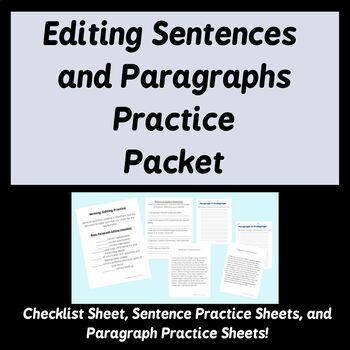
ELA Writing Packet - Editing Corrections Sentences Paragraph Checklist MS HS
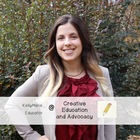
Revision and Editing Checklist for High School Essay Writing in High School

Personal Narrative Writing Checklist for High School - PDF and digital!!
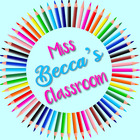
Ohio Checklist for writing a High School IEP

ELA Writing Packet - Review Editing Corrections Paragraphs Checklist MS HS
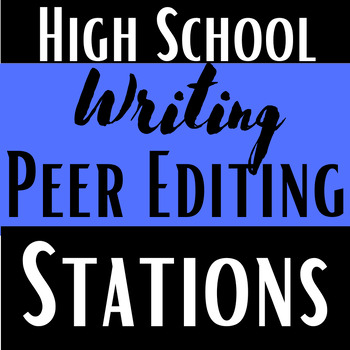
Peer Editing Stations & Checklist , High School Writing Review, PDF

High School Writing Checklists FULL YEAR BUNDLE! - PDF or digital
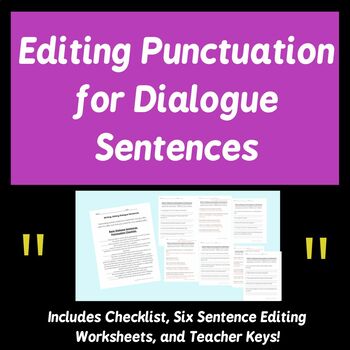
ELA Writing Packet - Editing Punctuation Dialogue Sentences Checklist MS HS
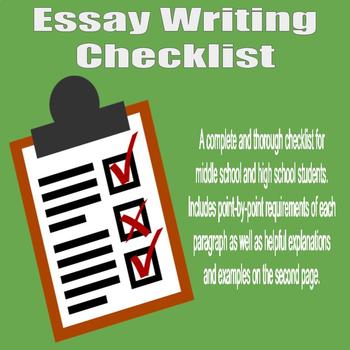
Essay Writing Checklist - High School and Middle School
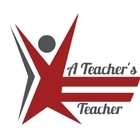
Thanksgiving Descriptive Writing Prompts AND Checklist Middle and High School
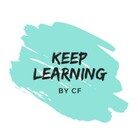
Christmas Descriptive Writing Prompts and Checklist for Middle and High School
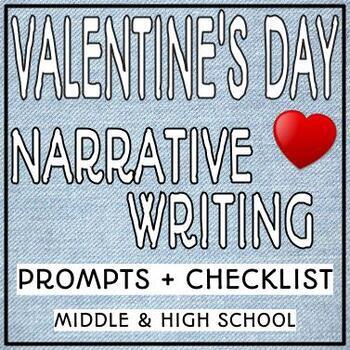
Saint Valentine's Day Narrative Writing Prompts and Checklist for High School
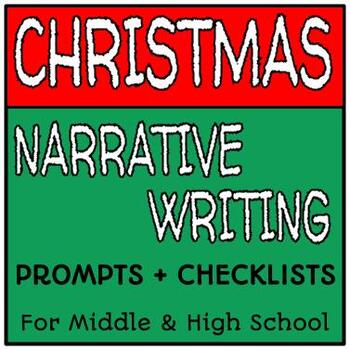
Christmas Narrative Writing Prompts AND Checklist for Middle and High School
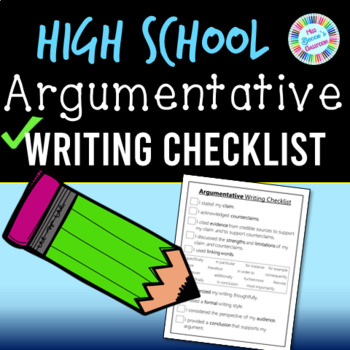
High School Argumentative Writing Checklist - PDF and digital!!
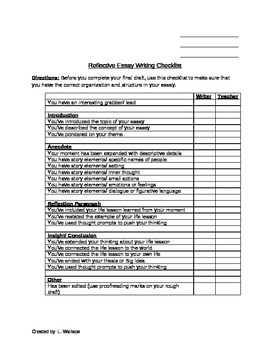
TC Writers' Workshop: Reflective/ HS / College Essay Writing Checklist

Thanksgiving Narrative Writing Prompts AND Checklist for Middle and High School
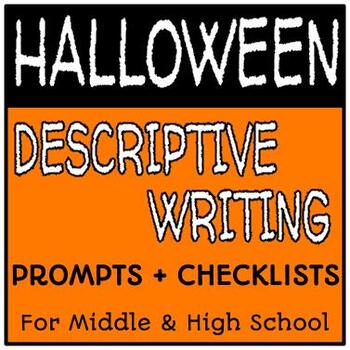
Halloween Descriptive Writing Prompts and Checklist for Middle and High School
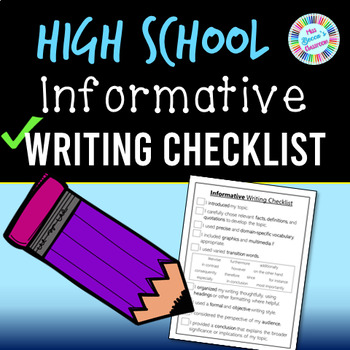
Informative Writing Checklist for High School - PDF and digital!!
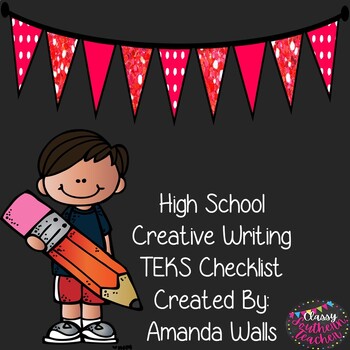
High School Creative Writing TEKS Checklist
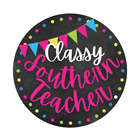
High School Narrative Writing Checklist - PDF and digital!!
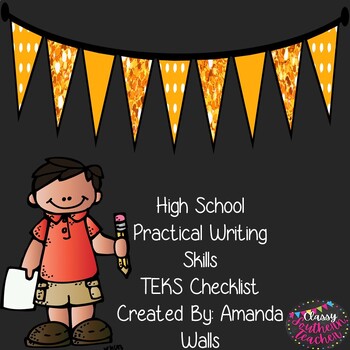
High School Practical Writing Skills TEKS Checklist
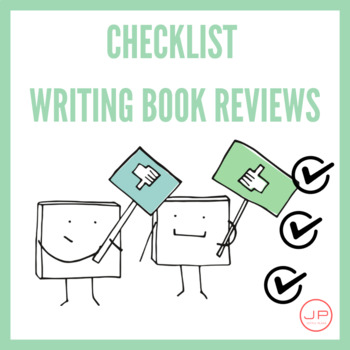
Checklist for Writing Book Reviews Middle and High School

CHECKLIST for Narrative Writing Middle and High School
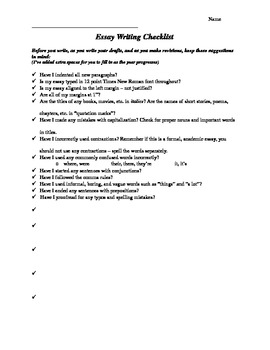
Essay Writing Checklist Middle School and High School

- We're hiring
- Help & FAQ
- Privacy policy
- Student privacy
- Terms of service
- Tell us what you think
Skip to Content
Other ways to search:
- Events Calendar
Want to write a college essay that sets you apart? Three tips to give you a head start

1. Keep it real. It’s normal to want to make a good impression on the school of your choice, but it’s also important to show who you really are. So just be yourself! Compelling stories might not be perfectly linear or have a happy ending, and that’s OK. It’s best to be authentic instead of telling schools what you think they want to hear.
2. Be reflective . Think about how you’ve changed during high school. How have you grown and improved? What makes you feel ready for college, and how do you hope to contribute to the campus community and society at large?
3. Look to the future. Consider your reasons for attending college. What do you hope to gain from your education? What about college excites you the most, and what would you like to do after you graduate? Answering these questions will not only give colleges insight into the kind of student you’ll be, but it will also give you the personal insight you’ll need to choose the school that’s right for you.
Have questions about college prep? We're here to help.
Written by CU Boulder Office of Admissions
- College-Prep
The University of Colorado does not discriminate on the basis of race, color, national origin, sex, age, pregnancy, disability, creed, religion, sexual orientation, gender identity, gender expression, veteran status, political affiliation, or political philosophy. All qualified individuals are encouraged to apply. You may view the list of ADA and Title IX coordinators and review the Regent policy .
As a student or prospective student at CU Boulder, you have a right to certain information pertaining to financial aid programs, the Clery Act, crime and safety, graduation rates, athletics and other general information such as the costs associated with attending CU Boulder. To view this information visit colorado.edu/your-right-know .
Apply for Admission
Visit Campus
Support CU Boulder
- Safety & Health Services
- COVID-19 Information
- Campus Communications
- Emergency Alert System
- New Student & Family Programs
Getting Around
- Campus Events
- Parking & Transportation
- Visit Information
Information for
- Faculty & Staff
- Journalists
Initiatives
- Business & Industry Collaborations
- Diversity, Equity & Inclusion
- Free Speech
- Innovation & Entrepreneurship
- Public & Outreach Programs
- Sustainability
- Understanding Your Cost of Attendance
International Primary School & Nursery Riverside School , Novogorsk

- [email protected]
- +7(985) 557 43 51

International primary Riverside School
Riverside School Novogorsk is an international primary school and kindergarten located in the North-West of Moscow adjoining the nature conservation area of the River Shodnya. We created Riverside School in response to a specific demand for bilingual programmes. Our school offers both British and Russian curriculums for children from about 2 to 12 years old. We have recreated a copy of a classic English school in Russia, but with a twist: Riverside School is one of the few schools in the area to offer two curriculums in two languages. This means that a Russian classic education is also present. We have worked hard to ensure that our pupils will get the best education possible and developed an innovative curriculum that combines academic excellence with an agile approach.
Our students are the expat children and graduates of bilingual kindergartens. We provide a happy and caring community in which it is easy to grow, learn and and play. We do our best to ensure that that every single child is happy, fulfilled and appropriately challenged .

School life
Why riverside school.

English environment
Complete immersion in the English language environment

Effective programme
Our unique curriculum is based on two educational systems

Top Teachers
Highly experienced staff of native English speakers

Pupil-centric approach
Small classes, caring teachers

Safe and secure
Security on campus and a safe school area

Full day school
We look after the children from 7:30 to 20:00

Digital tools
We use an array of digital tools to facilitate the learning process

Healthy lifestyle
We offer a large swimming pool and a tennis court

Key Stage 1 5-7 years 0, 1, 2 classes
The National Curriculum subjects are English, Maths, Science, History, Geography and else...

Key Stage 2 7-12 years 3, 4, 5, 6 classes
Key stage 1 lessons with additional foreign language (French / Spanish)
- Russian Curriculum
The Russian programme of Riverside School fully complies with the norms of the Russian Federal State Educational Standard (FGOS). It is supplemented by our unique and innovative methods aimed at harmonious and comprehensive development of the child’s personality.
School preparation (5-7 years old).
The teachers’ work is based on the FGOS Basic Educational Model of preschool education. However, as the teaching and learning process happens in English and follows the British National Curriculum, our Russian preschool programme was slightly modified to meet the requirements of the British programme in order to maintain children’s interest in learning.
Russian Primary Education (7-12 years)
The structure and content of primary educational programme of Riverside School is fully consistent with the Federal State Educational Standard (FGOS). The teaching is based on the programmes recommended by the Ministry of Education of Russia: the 21st Century School and the School of Russia.
Founder's greeting
I am extremely proud to be Founder and Director of Riverside School and it is my pleasure to welcome you to our school in Novogorsk.
We aim to create at our school a positive and hard-working learning environment where each child has an opportunity to develop as an educated and decent individual, as we foster pupils’ strengths and talents; we give them responsibility and believe that they should be supported to do their best.
Each child is respected, protected and encouraged to achieve great academic results. Good manners and respect for teachers and one another are also highly valued. We nurture pupils’ creativity and ensure that all our children enjoy learning and have fun.
Children at our school are passionate and motivated keen learners; when you come to Riverside school you will meet happy children whose excellent behaviour reflects their enthusiasm for studies.
Starting school is a very important and exciting time for children and their parents. Positive relationships between parents, teachers and children ensure the best possible opportunities for achievement, progress and success.
Our staff are always happy to talk to parents if there are any questions you would like to discuss.
Welcome to Riverside School!
Dr. Larisa Tsekhanova

International Riverside School
- About Riverside School
- Why choose us
- Enrollment 2023-2024
- Extra Curriculum activity
- School calendar
- Weekly menu
- School contacts
- How to get to school
- Russia, 141435, Moscow Region, Khimki, Novogorsk, Nagorye 12, Zarechnaya St, 20, vladenie 1
- 2024 @ All rights reserved
By public transport
By suburban train from Leningradskii station to Khimki station or Levoberegnaya platform (a district on the left bank of Moscow channel).
A lot of buses and marshrutkas run from Rechnoy Vokzal metro station, at the north end of the Green Line. You can also reach Khimki by marshrutka, bus or trolleybus from Planernaya metro station.
The most comfortable way to explore the city is to bike or take a car .
Navigation menu
Justice League of Greater Lansing awards $50K in scholarships as first reparations disbursement
LANSING — The Justice League of Greater Lansing Michigan made its first distributions from its Reparations Fund in the form of 10 $5,000 scholarships to graduating seniors in the region. The fund was created to address the racial wealth gap in Greater Lansing.
The students submitted essays about the racial wealth gap, how it has affected them and their communities and what can be done to address it.
“A common thread in their essays is that discrimination today has resulted from years of social injustices," Willye Bryan, founder and vice president of the Justice League of Greater Lansing Michigan, said in a news release. "It continues to limit African American families’ access to basic wealth builders — education, higher paying jobs and home ownership. This doesn't allow for generational wealth building, nor does it allow for closing the Racial Wealth Gap."
The winners were honored at a reception on Aug. 3. They are listed here with their hometown, high school and where they will study this fall:
- Zachary Barker, East Lansing, Okemos High School, Michigan State University
- Olivia Burns, East Lansing, East Lansing High School, MSU Honors College
- Ahja Crawford, Lansing, Holt High School, Lansing Community College
- Marvin Deh, Lansing, Eaton Rapids High School, MSU
- Lydia-Anne Ding-Mejok, Lansing, East Lansing High School, Central Michigan University
- J'Kyla Hobbs, Lansing, Haslett High School, University of Michigan
- Braelyn Jackson-Pointer, Lansing, Grand Ledge High School, Howard University
- Nala Noel, East Lansing, East Lansing High School, School of the Art Institute of Chicago
- Hailey Perkins, Okemos, Okemos High School, Howard University
- Joseph Pizzo, Lansing, J.W. Sexton High School, Siena Heights University
Here are essays from two of the winners:
Politics and policies block generational wealth
Generational wealth is something Black families struggle to have. It seems like there are obstacles put in our way to keep us from attaining it, and people ready to knock us back if we look like we are going to achieve it. Generational wealth means having resources, property, assets, valuables, money, businesses you can pass on in your family from generation to generation.
Having generational wealth gives the next generation opportunity and a head start for success. It gives families a sense of financial security. When I think of generational wealth I think of families like the Rockefellers, Gateses, and Buffets. Recently, some famous Black people have achieved billionaire status like Michael Jordan, Jay Z, Lebron James and Oprah. But the rest of us are still struggling to get by.
My family is working to achieve generational wealth. My maternal great-grandmother was an entrepreneur. She was “The Help.” My grandmother was The Help's help, and my mother was three times The Help. My great-grandmother desperately wanted more for her family. She and her husband had 10 children and started out in the projects. They eventually purchased their own home and my grandmother had to go to work. She began as a maid, but in time started her own business called, “Days Work,” a maid service.
She and her husband saved money and she later became a certified nursing assistant. The money from that job was used send their children to college and to buy a small rental apartment complex. She became a widow at a young age and the money she generated sustained her for her entire life. She left an inheritance for each of their 10 children, which helped jump-start their future.
The lessons learned from her example laid the foundation for the pursuit of generational wealth for our family. We have not achieved billionaire status, but we are working to make sure the next generation does better than the one before.
African Americans have less generational wealth because politics and policies have blocked our potential. Homeownership is really important for generational wealth. A home is something that can be passed from generation to generation. It can build equity that a family can use to borrow against to start a business. Many Black families are not able to afford a home, cannot obtain a loan to make the purchase, or their home is marked as lower value.
Creating programs that will help African Americans afford homes is key in addressing the wealth gap. Lack of financial literacy also contributes to the problem. You have to understand what to do with money, how to stay out of debt, invest and save.
Generational wealth is worth pursuing. African Americans have to stand up against systems that were created to keep us down. When I think of the solution to the generational wealth problem, I think of the Kwanzaa principles, particularly Ujamaa, cooperative economics. We must understand that all of us, not just one or two, needs generational wealth.
— Zachary Barker, an Okemos High graduate, plans to attend Michigan State University
Adoptive, biological families provide first-hand case study in generational wealth
According to the Federal Reserve's Survey of Consumer Finances, “between 2019 and 2022, median wealth increased by $51,800, but the racial wealth gap increased by $49,950 adding up to a total difference of $240,120 in wealth between the median white household and median Black household.”
Historically speaking, there have always been disparities between white and Black Americans. For example: access to education, job opportunities, and housing. All of which prohibited access to greater resources. Past discrimination directly affects the lives of Black Americans today.
I have had the unique opportunity to learn this from both sides. As a Black transracial adoptee,I was exposed to the generational differences that changed the amount of income in my white parents' household and my biological family's household.
Racial disparities passed down, including the environment where a family begins, play a big role in the amount of income a family can make in the future. According to my grandmother, my adoptive parents' families started in Virginia and other southern states and moved to Detroit for factory jobs, more specifically working for Henry Ford car factories.
My biological family mainly lived in Detroit their entire lives; my great-grandfather wasn’t able to get a job in factories at the time because employers didn’t want jobs to be taken from white people. Because of this, he mostly worked as a cook when he could. Since it was difficult for my biological family to get jobs to have enough food on the table, many children in my family had to start working as young as 10 years old instead of going to school, and this cycle continued throughout the years.
My adoptive family had the privilege of going to high school, and few had the opportunity to attend college. Today, both my adoptive parents went to college paid for by their parents and received bachelor's degrees. Neither of my biological parents nor siblings have had the opportunity to attend college, and most were barely able to finish high school because they had other responsibilities like working or providing childcare for my younger siblings.
Today my adoptive family owns their homes and no one in my biological family owns their homes. Even when applying for jobs, a study done by Bowdoin University found that employers just looking at resumes are 30% more likely to hire applicants they believe are white based off their name than Black.
Narrowing the wealth gap could potentially be very simple if the government can change its institutional racist ways. We can eliminate redlining and housing discrimination causing Black Americans to not have access to certain houses and to pay more property taxes despite receiving fewer benefits than white-dominated areas. This originated all the way back to the civil war period to try to force Black Americans to move back to plantations.
We also need to increase access and expand equity for higher education for low-income families and minimum wage should be raised to match the cost of living.
— Olivia Burns, an East Lansing High graduate, plans to attend Michigan State University Honors College
Advertisement
Supported by
How Kamala Harris Trusted Her Gut and Picked Tim Walz
The ambitious Josh Shapiro asked about his role as vice president. The battle-tested Mark Kelly was already seen as a third option. And the happy-go-lucky Mr. Walz promised to do anything for the team.
- Share full article

By Shane Goldmacher Katie Rogers Reid J. Epstein and Katie Glueck
Follow live updates on the 2024 election .
When Vice President Kamala Harris gathered some of her closest advisers in the dining room of the Naval Observatory on Saturday, they had more choices than time.
Her team had just wrapped up the fastest, most intensive vetting of potential running mates in modern history, a blitz of paperwork and virtual interviews that had concluded only on Friday. The advisers were there to present their findings on a list that still technically ran six deep to Ms. Harris, who had less than 72 hours to sift through it to make her final decision.
One by one, the circle of her most trusted confidants ran through the pros and cons of each possible No. 2. The sessions went long enough to be broken up with sandwiches and salads as the team eventually focused on the three men she would meet the next day for what would prove to be pivotal in-person interviews: Gov. Tim Walz of Minnesota, Senator Mark Kelly of Arizona and Gov. Josh Shapiro of Pennsylvania.
Polls had been conducted. Focus groups had been commissioned. Records reviewed. And the upshot, Ms. Harris was told, was this: She could win the White House with any of the three finalists by her side.
It was the rarest of political advice for a political leader at the crossroads of such a consequential decision. And for Ms. Harris, a vice president who had spent much of her tenure trying to quietly establish herself without running afoul of President Biden, the advice was freeing rather than constricting.
She could pick whomever she wanted.
On Tuesday, she did just that, revealing Mr. Walz as her running mate after the two struck up an easy rapport in a Sunday sit-down at her residence, forming a fresh partnership that will define the Democratic Party in 2024 and potentially beyond. The story of how Ms. Harris came to pick Mr. Walz was told through conversations with about a dozen people involved in the selection process, many of whom spoke on the condition of anonymity to describe deliberations and discussions that were intended to remain private.
We are having trouble retrieving the article content.
Please enable JavaScript in your browser settings.
Thank you for your patience while we verify access. If you are in Reader mode please exit and log into your Times account, or subscribe for all of The Times.
Thank you for your patience while we verify access.
Already a subscriber? Log in .
Want all of The Times? Subscribe .

IMAGES
COMMENTS
Essay Writing: Writer's Checklist Introduction: Is the main idea (i.e., the writer's opinion of the story title) stated clearly? Is the introductory paragraph interesting? Does it make the reader want to keep on reading? Body Paragraphs: Does each body paragraph have a clear topic sentence that is related to the main idea of the essay?
High School Version Use the checklist below to help you revise your rough draft before you copy it into your writing folder. IDEAS AND CONTENT My paper has a clear purpose or makes a point. I choose clear details and examples to help the reader understand my message. I stick to the main idea. I leave out details that do not matter.
Attributed to: The Saylor Foundation and Amy Kasten www.saylor.org Page 1 of 3. Argumentative Essay: Revision Checklist. REVISION CHECKLIST: Directions:Find, highlight, and revise these elements in your informational article. **If you don't have one of these things, ADD it!**. _____ The essay includes an attention-grabbing hook.
By completing a peer review you will be able to create a better thesis statement and supporting arguments. Using a checklist to complete your review will allow you to rate each of the parts in the paper according to their strength. There are many different peer review checklists, but the one below should be helpful for your assignment.
For a high school essay, this could be just three paragraphs, but for a graduate school essay of 6,000 words, the body could take up 8-10 pages. Paragraph structure. To give your essay a clear structure, it is important to organize it into paragraphs. Each paragraph should be centered around one main point or idea. ... Checklist: Essay 0 / 14.
Create an outline. Make a rough outline of the sections and points of your essay. Writing your ideas down will help you organize your thoughts and see what you need to add, change, or rearrange. Provide evidence. Use evidence from your research to support your ideas.
Keep in mind that some types of essay writing may not require an argument, such as a narrative essay. However, the standard high school essay structure typically requires a thesis statement. 4. Make an outline for the paragraphs in your essay. Write an outline to plan out the overall structure and content of your essay.
Types of High School Essay. 1. Narrative Essay. Narrative essays tell a story from the writer's perspective, often highlighting a personal experience or event. The focus is on storytelling, including characters, a setting, and a plot, to engage readers emotionally.
Janelle Schwartz, English 201. This is to give you an idea of the type of things you should be looking for and accomplishing in both your own paper and that of your peer (s). Use what follows as a kind of checklist for determining what is working effectively in a paper and what is not. Introduction. Has the writer (either yourself or your ...
Checklist: Essay 0 / 14. My essay follows the requirements of the assignment (topic and length). My introduction sparks the reader's interest and provides any necessary background information on the topic. My introduction contains a thesis statement that states the focus and position of the essay. I use paragraphs to structure the essay.
Make sure you speak to your family before applying early decision. Check out this page for some Early Action (EA) and Early Decision (ED) Tips. 📅 Categorize your essays and create an essay writing plan. Once you've figured which colleges to apply to, copy and paste all the essay prompts you have to answer.
IEW® in High School. The high school years can be daunting, but writing does not have to be. IEW teaches students how to navigate the essays, research papers, and literary analysis that they will need to succeed in high school and beyond. IEW's pathway for high school is designed to help beginning students gain confidence while continuing to ...
Here are some themes they could explore from their unique point of view: Internet (see 50 privacy essay topics here) Climate change and global warming (see our list of 53 Earth and Environmental prompts) Fake news. Obesity in the United States. Immigration, illegal immigrants, and a path to becoming a citizen.
The following ideas work well for compare-contrast essays. ( Find 80+ compare-contrast essay topics for all ages here.) Public and private schools. Capitalism vs. communism. Monarchy or democracy. Dogs vs. cats as pets. WeAreTeachers. Paper books or e-books. Two political candidates in a current race.
After the self-edit is complete, discuss the process with the students. Next, choose another student to serve as the peer editor for the piece that was just self-edited. Have the two students sit in the middle of the class so that all students can see and hear them as they work through the peer-editing phase. Afterward, include the entire class ...
A persuasive essay will require a checklist with evidence of opinions and data to back up claims, whereas a narrative essay may need criteria for evaluating figurative language usage. But don't be ...
Join thousands of students and parents getting exclusive high school, test prep, and college admissions information. Visit CollegeVine.com Discover schools, understand your chances, and get expert admissions guidance — for free.
Creating a timeline and checklist can significantly ease the college preparation process. Break down tasks by year or semester to manage your time effectively. ... Writing is a fundamental part of college coursework, from essays to research papers. High school is the perfect time to hone your writing abilities. Take advantage of English classes ...
This essay writing checklist is a wonderful tool that can be provided for students to help guide the essay writing process. With point-by-point requirements for all parts of an essay (introduction, body paragraphs, and conclusion), students will be able to track their writing along the way or after the first draft to help with revisions.
Essay Writing Checklist - High School and Middle School. by . A Teacher's Teacher. 4.8 (6) $1.50. PDF. This essay writing checklist is a wonderful tool that can be provided for students to help guide the essay writing process. With point-by-point requirements for all parts of an essay (introduction, body paragraphs, and conclusion), students ...
Bring the campus tour checklist. Start learning about federal and New York State grants and scholarships. Consider the types of careers that fit your interests and what college majors they require. Reach out to school counselors and/or mentors to discuss occupational interests and college requirements.
Sometimes the hardest part is just getting started, but the sooner you begin, the more time and thought you can put into an essay that stands out. Check out some tips: 1. Keep it real. It's normal to want to make a good impression on the school of your choice, but it's also important to show who you really are. So just be yourself!
Applicants are required to complete an application including an application form, an essay or essays, resume or CV, transcripts from all post-secondary courses of study, two letters of recommendation, test scores, and an application fee. A checklist and additional information are included below. Application Checklist. Prerequisites* Transcripts
Riverside School Novogorsk is an international primary school and kindergarten located in the North-West of Moscow adjoining the nature conservation area of the River Shodnya. ... WHICH IS HIGHLY REGARDED WORLDWIDE FOR ITS HIGH QUALITY EDUCATION. Key Stage 1 5-7 years 0, 1, 2 classes. The National Curriculum subjects are English, Maths, Science ...
View about Sports Venues & Stadiums in Krasnogorsk, Moscow Oblast on Facebook. Facebook gives people the power to share and makes the world more open and...
Khimki is a city located in Moscow Oblast, Russia, which is situated about 23 kilometers northwest of Moscow. It is one of the most significant industrial centers in the region and has a population of approximately 253,000 inhabitants as of 2021. The city is connected to Moscow by the Moscow-St. Petersburg highway and the Moscow Central Circle ...
Khimki is part of the Moscow conurbation, on the banks of the Moscow channel and the Klyazma river, and one of the highest density rate in the region.. Before the city, there were several noble lands, which villages are still exist. During the late 19th century, the site of Khimki station became (and remains) the place of Muscovite dachas. Khimki was granted city status, and the Stariye Khimki ...
Ten high school graduating seniors each received a $5,000 Reparations Scholarship from the Justice League of Greater Lansing. ... The students submitted essays about the racial wealth gap, how it ...
Mr. Walz speaking to students at Mankato West High School in 2007, shortly after being elected to Congress. He was a teacher and a football coach at the school before running for office. Credit...